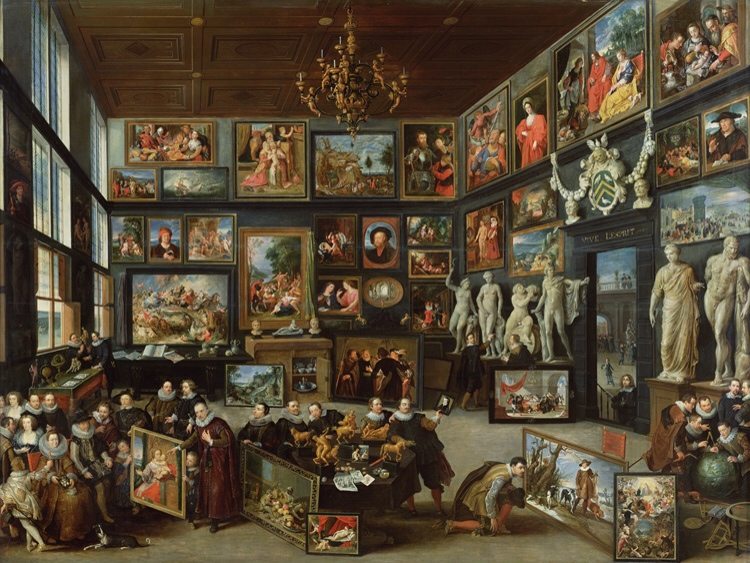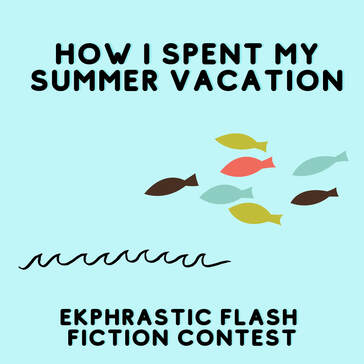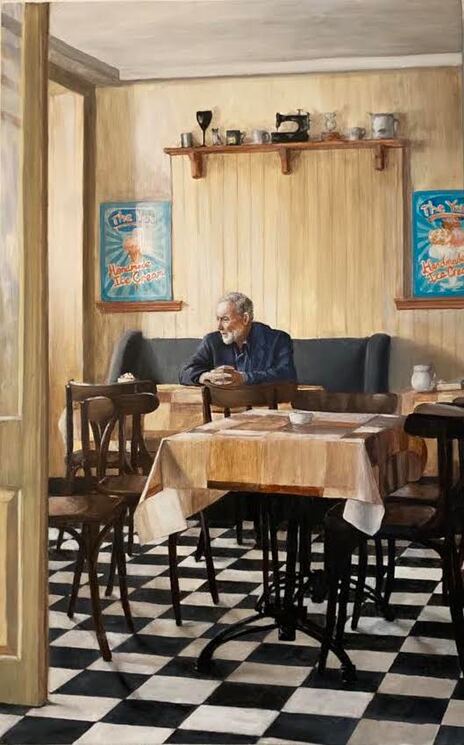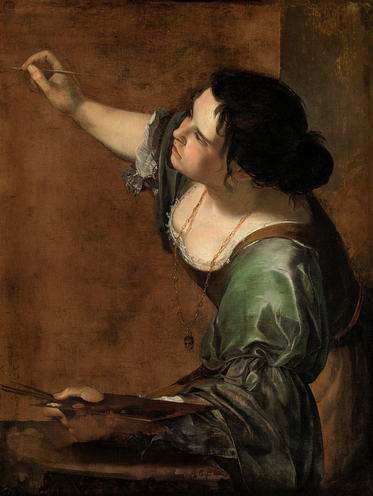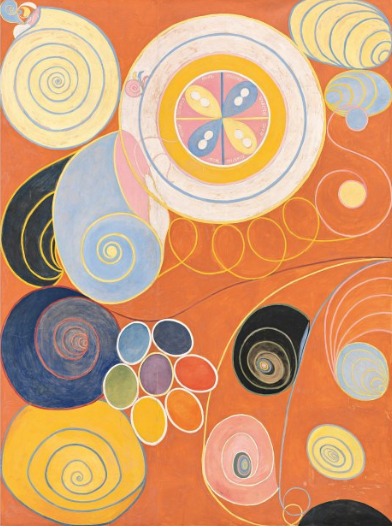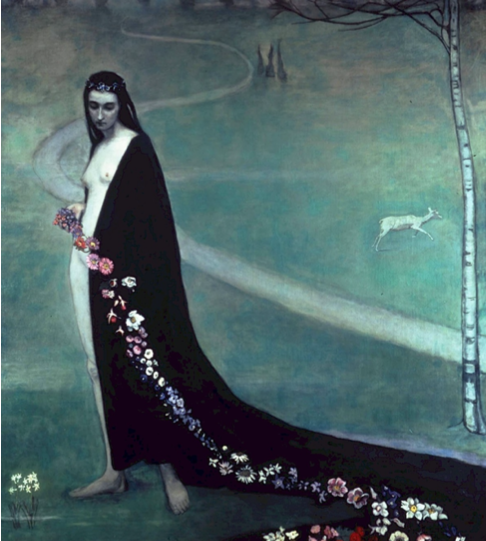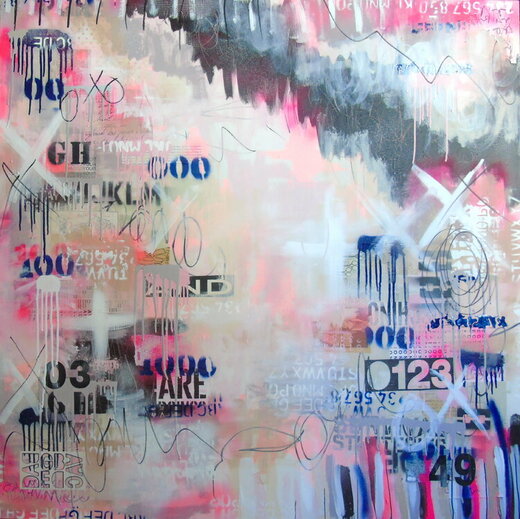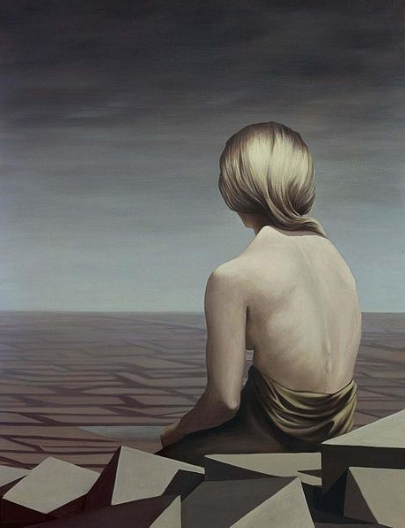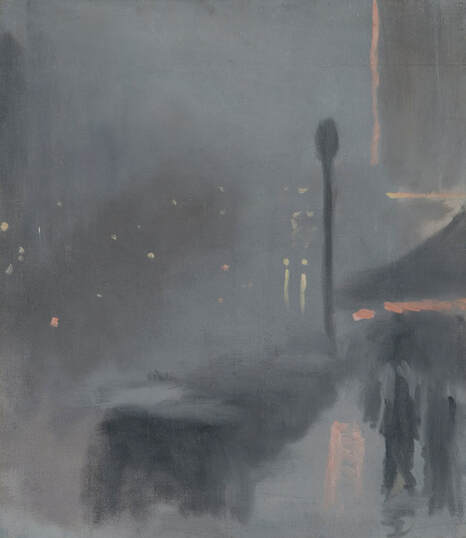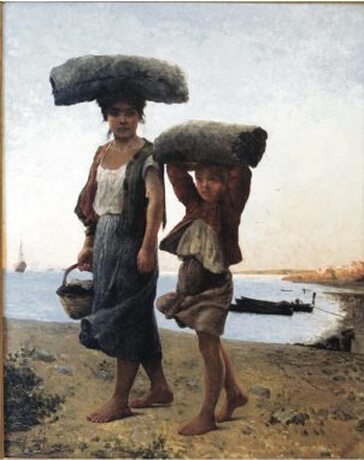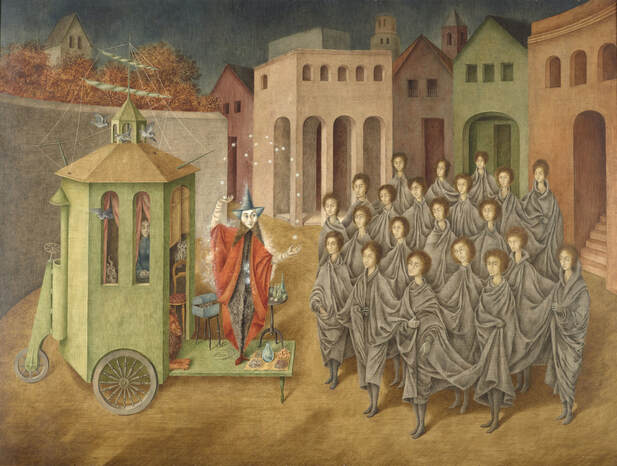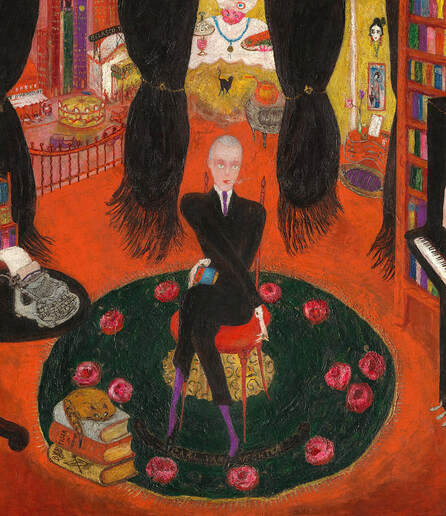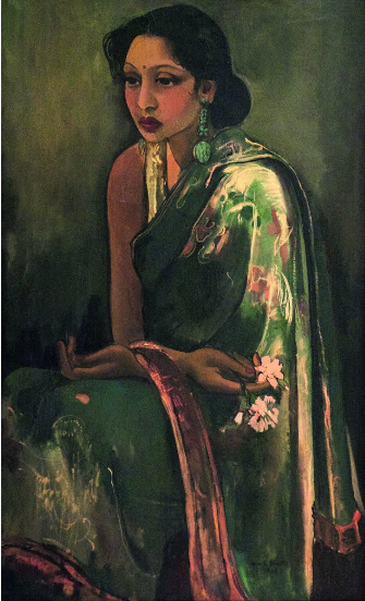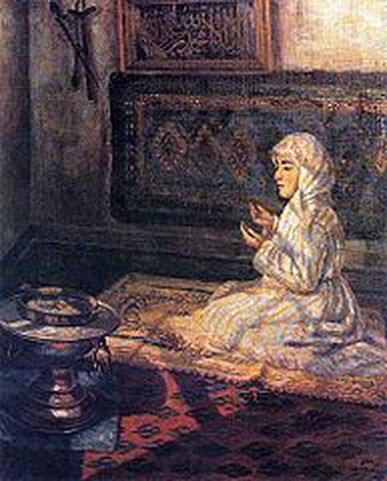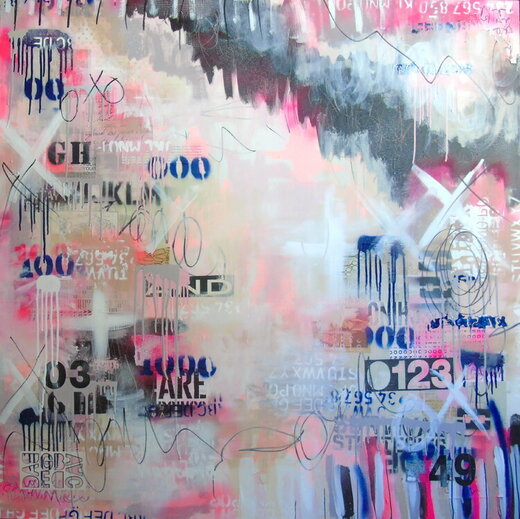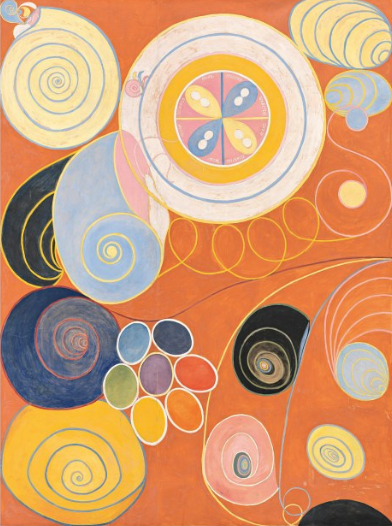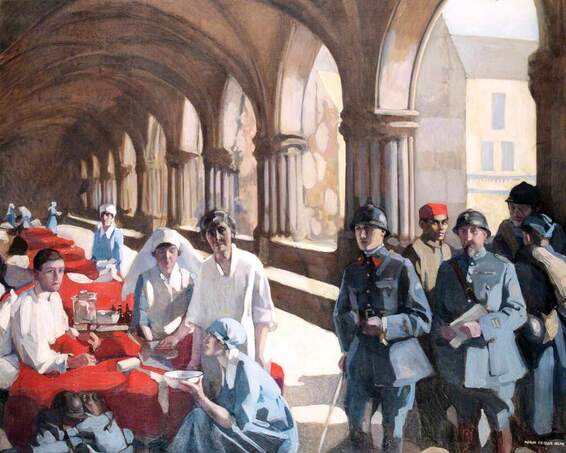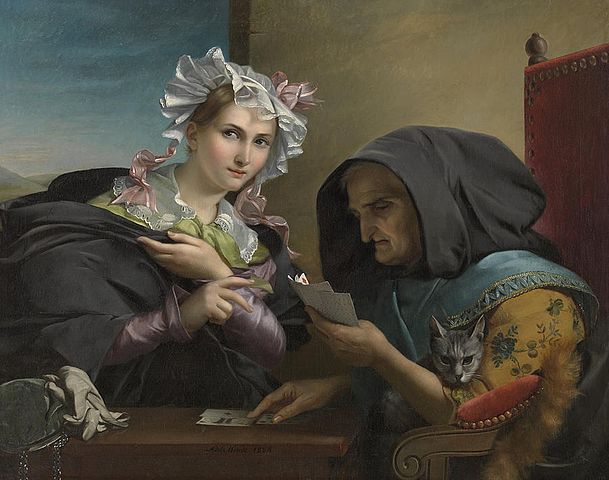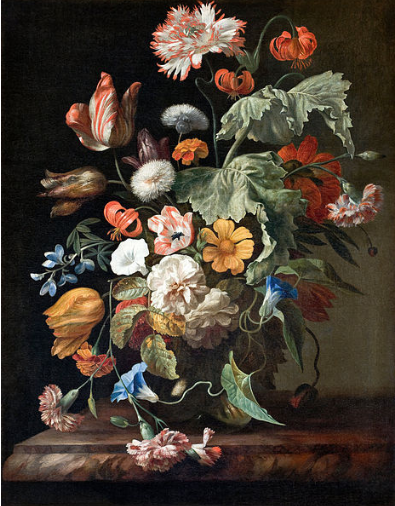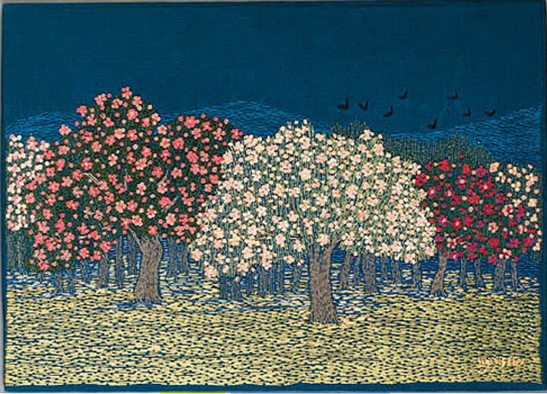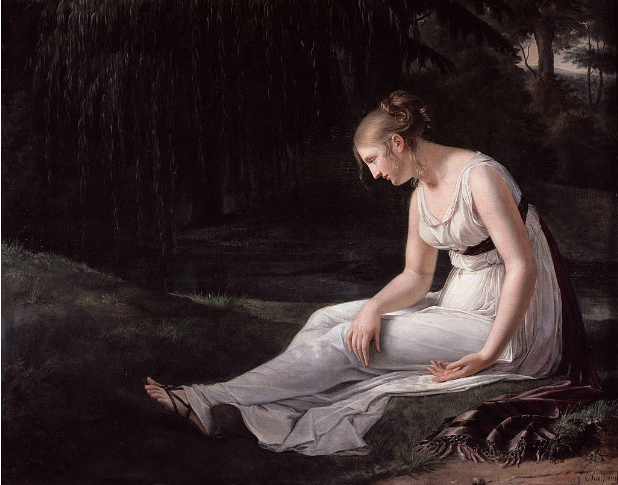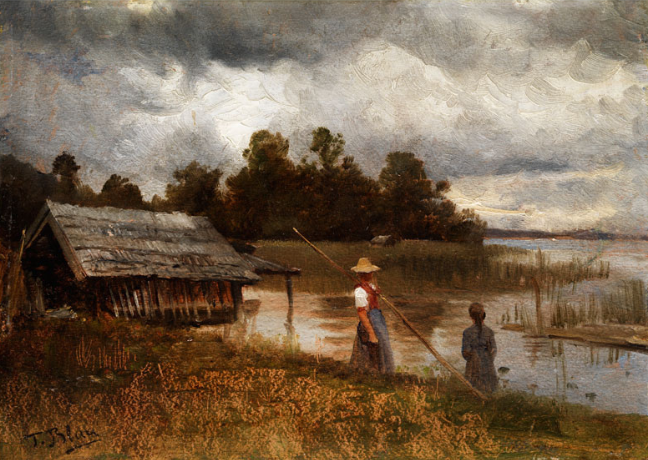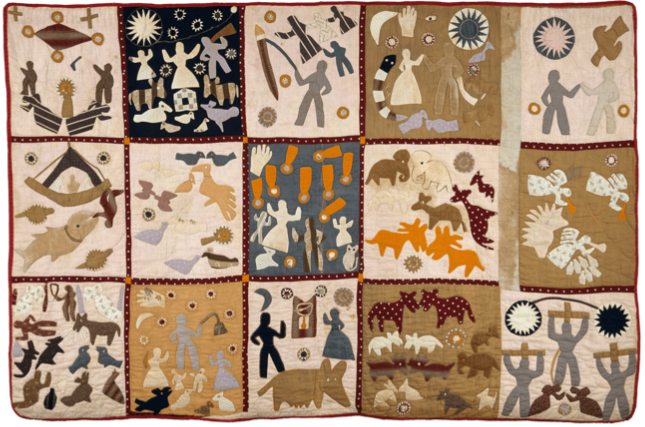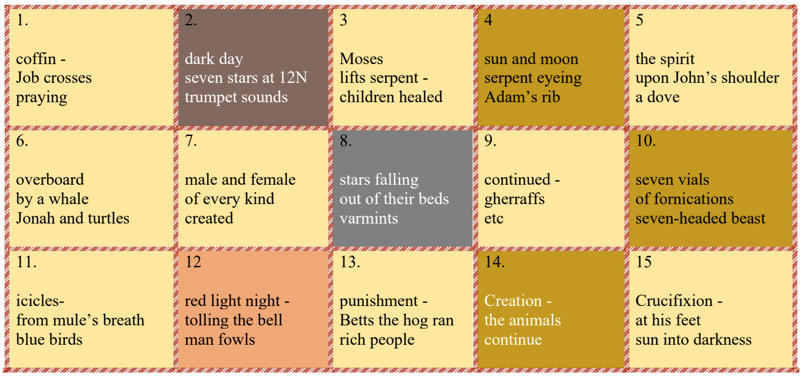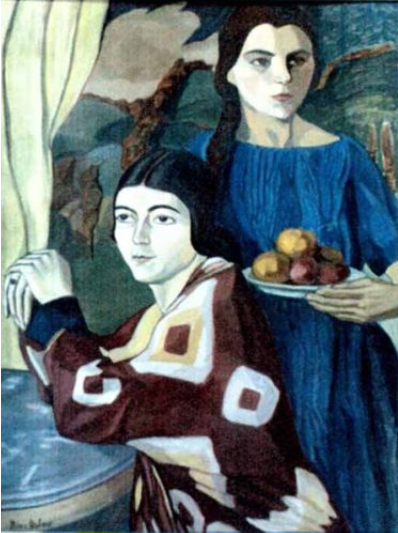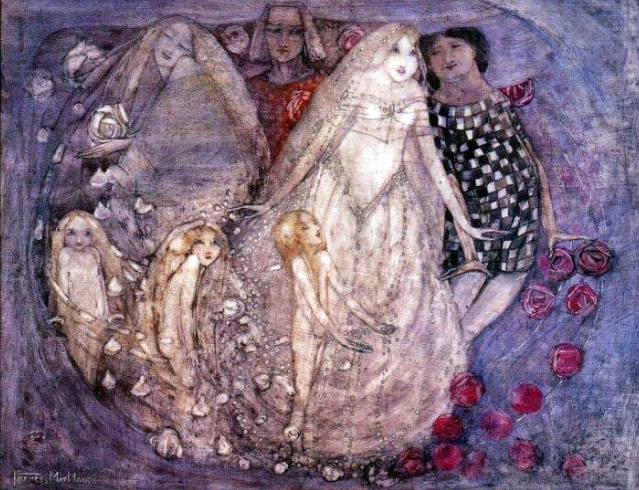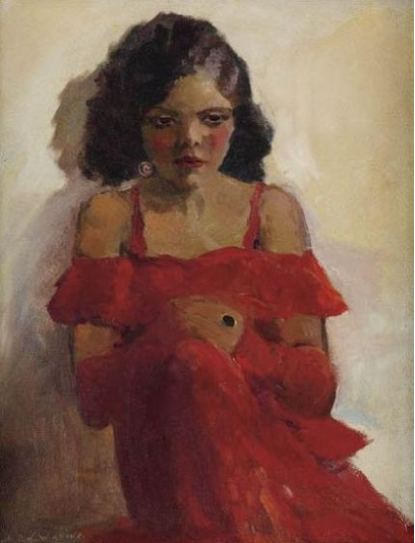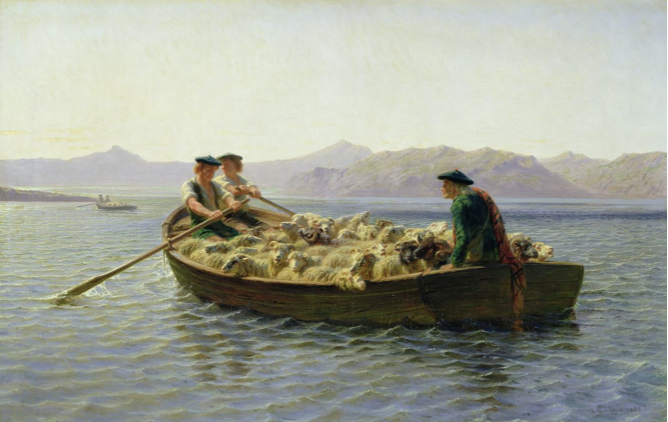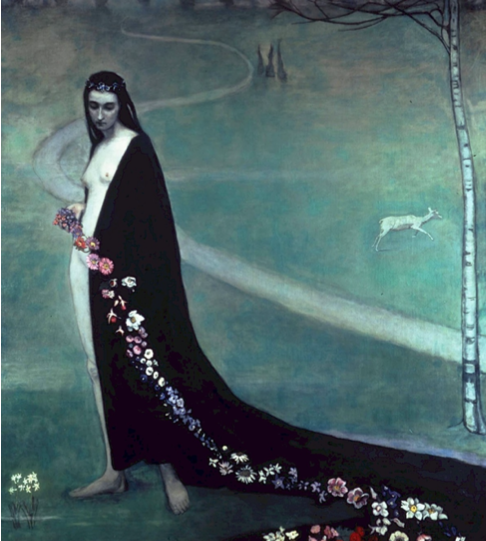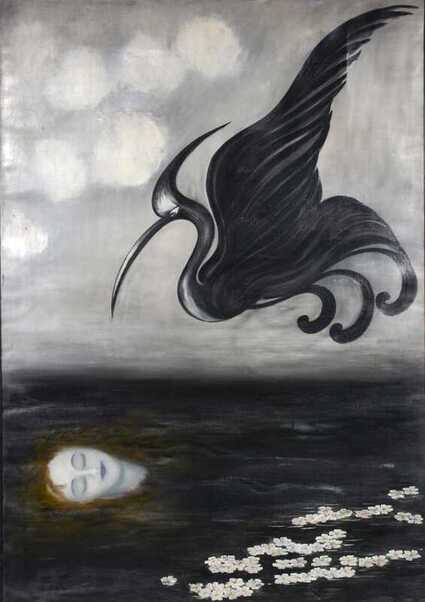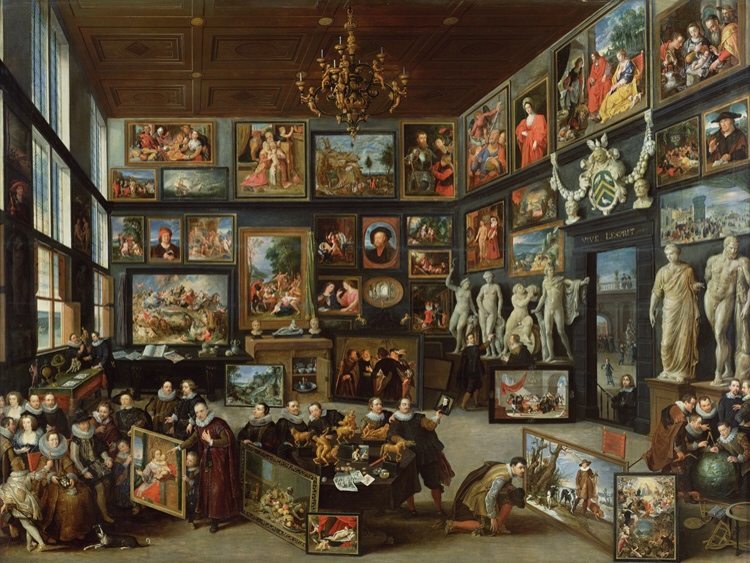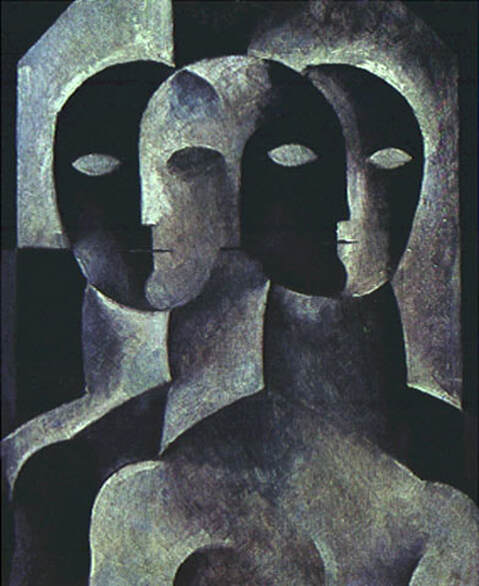|
A Resting Place On a warm Paris afternoon A time to meet those missed most We entered 'Joyful resurrection through the gates of death'. Wandering through lanes, breathing history Drifting through ages, stopping every few feet Reading the years of existence, family names And listening to the murmur of a thousand lands. Peace reigned in every corner, conversations rose With passing of time and more of them coming alive. There were stories of love, heart breaks and triumphs, Deceits, great deeds from years ago. An epitaph rose celebrating the outcasts In Pere Lachaise near the tomb of Oscar Wilde And accompanying plinth with an inscription carved, A journey being photographed by many now. Springing pink patches in my palms, blue veins in my arms And turning the flesh white. In Montparnasse Cemetery next Jean-Paul Sartre and Simone de Beauvoir continued Their friendship of fifty years. Time standing still for us To hear the unsaid and romancing death. Abha Das Sarma An engineer and management consultant by profession, I enjoy writing the most. Besides having a blog of over 200 poems (http://dassarmafamily.blogspot.com), my poems have appeared in Muddy River Poetry Review, Spillwords, Verse-Virtual, Sparks of Calliope, Trouvaille Review, here and elsewhere. Having spent my growing up years in small towns of northern India, I currently live in Bengaluru. ** My Haiku The Virgin and child dazzles its spectators' eyes in the autumn haze. Japanese: 聖母子の後光眩しき秋麗 Toshiji Kawagoe Toshiji Kawagoe, Ph.D. is a professor at Future University Hakodate. He lives in Hokkaido, Japan. His poems in ancient Chinese have been published in the anthologies of Chinese poetry and his science fiction short stories in S-F Magazine and Anotherealm. His academic works in economics are also published in many books and academic journals. ** The Bane of Marie Kondo Marie Kondo would be aghast at the clutter (only the ceiling and windows are spared), no matter that paintings are by Renaissance masters, stack upon stacks, ogling the Venus of Modesty and copies of other Greek statues in various states of undress, their limp penises drawing the eyes of important people garbed in velvet layers and suffocating ruffs, pretending to appraise a portrait of the Virgin and Child or a genteel man walking his dogs. Her head would spin at the muddle of sculpture pieces and prints on tables, random frames on the floor resting on still more stuff, and gallimaufry stashed behind still more frames, presumably hidden from the view of prickly nobles. The mishmash of images would give her vertigo. Would it matter that they were by van Eyck, Durer, or Rubens? Would she know these names? The doyenne of decluttering, simplifying, and organizing would not abide by this mess. She will discard, dump, ditch. She would implore van der Geest to take items he likes least and thank these pieces so that he can let them go – to a sidewalk sale, a thrift store, even Goodwill. Then she would impose order, perhaps frame size, or dominant color, or subject (naked ladies, warring men), or number of people in the scene. She would encourage van der Geest to divide the gallery into two floors, each floor sectioned into rooms displaying pieces grouped according to some system. Would that she had a magic wand to enforce her sensibility! Because van der Geest and his 17th-century ilk would find her ludicrous and banish her. So would the multitudes of hoarders and chronic shoppers. Ann Maureen Rouhi Ann Maureen Rouhi is Filipino by birth, Iranian by marriage, and American by choice. She is a reluctant writer, but tries nevertheless so she can tell her life stories. ** On My First Visit to The Art Institute in Chicago: A Tanka Sequence I. A feast for the eyes An expansion of the mind Succor for the soul Such internal rejoicing Both challenging and peaceful II. What to look at first? A sensory overload Giddy as a child Paintings vie for attention Much to see in little time III. A careful study - Perusing so thoroughly - Or just a quick scan? Quality or quantity? This is the question, Shakespeare IV. I choose depth today Opting for great absorption - Soulful lingering Not superficial grazing . . . And I make it through one wing V. Far too wrapped up in The Sargents and in Nighthawks, I miss the Monet And the French impressionists Much to my disappointment VI. I vow to return To give all the other wings As much attention As much thought and as much care As I gave this one today VII. My mind all abuzz With a fresh new energy My soul so nourished And my heart filled to bursting I leave quite reluctantly Rose Menyon Heflin Rose Menyon Heflin is a poet and artist from Wisconsin who enjoys nature and travel. Although currently busy cyanotyping, screenprinting, and photographing plants and cranes, she also enjoys mixed media collage, watercolor painting, and papermaking. Among other venues, her poetry has recently been published or is forthcoming in 50 Haikus, Ariel Chart, Asahi Haikuist Network, Bramble, The Closed Eye Open, The Daily Drunk, Deep South Magazine, Dreich Magazine, Eastern Structures, The Ekphrastic Review, Haikuniverse, The Light Ekphrastic, Littoral Magazine, Please See Me, Plum Tree Tavern, THE POET, Poetry and Covid, Red Alder Review, Red Eft Review, Sparked Literary Magazine, The Texas Poetry Calendar, Three Line Poetry, Trouvaille Review, Visual Verse, The Wisconsin Poets’ Calendar, The Writers Club, and various anthologies. Her poetry recently won a 2021 Merit Award from Arts for All Wisconsin. ** A True Story in the Gallery of Cornelius van der Geest She’s come to choose! Great slabs of art stack the walls - Mary Magdalens, Apollos, Apostles, shepherds- She’ll have her pick. His lucky day! the tourmaline blue Through lattice windows Picks out the best The jewel of Cornelius’s chamber: Quintin Matsys! His Magdalen. (Yes, you’ve heard the story? Cornelius Saving Master Matsys’ bones? Rescuing them From the little churchyard, burying them At the foot of the cathedral, What a troop we were, All of Antwerp watching!) Yet I see it’s the Archduke Albert Not dear Isabella, who covets The Matsys. Her eye might glance At that interfering young courtier In gaudy gold shoes, But as she’s known to be pious It’s the tiny Brueghel she holds. Or perhaps she has noticed The Memento Mori above the door Or has spotted Holofernes, poor Holofernes! Drugged and sleepy, pale naked neck With Judith’s brawny arm upraised! Cornelius, praising again such mastery, Is seized at the heart - Can he relinquish this, Even to the Duke? The good burghers of Antwerp Appear unconcerned about the great purchase About to occur Or perhaps to hide their interest, Gather round the globe, sextant and astrolabes. And in the end, Cornelius won’t sell! (Remember the bones? The cathedral tower?) Too hot his love for this Madonna. ‘Come!’ says Isabella, ‘Let us take the Titian. Come, Echo, heel.’ And so they go, the spice merchant, the Duke and Duchess, The painter, all appeased As Echo, ever loyal, Keeps to his mistress’s heels And follows Lucie Payne Lucie is a retired librarian writing as much as she can. ** The Gallery of Cornelis van der Geest and Agoraphobia My husband Michael and I are in Maysville, Kentucky for Christy’s art gallery/hair salon opening. I’m interested. I’ve never seen an art gallery combined with a salon, but Christy makes jewelry. Christy has made a lot of jewelry. There are lots of foods on trays, and I want a cookie, but I am fat and will not eat in front of people. It’s crowded. I haven’t been in a crowd since before Covid. Before Covid, I was already diagnosed with agoraphobia—fear of going out. It can manifest in many ways. Some people are afraid to leave their home. Some people, like me, do not do well in crowds, or with talking to strangers. I’m a teacher. I am always terrified. I don’t know how much longer I can keep this up. There are tumors growing in my uterus from the terror I push down everyday. Well, at least this is the narrative I tell myself because it will give me a reason to find other work. It’s an easier narrative than the truth: my aunt has tumors, my mother had tumors—both ended up infertile. Both had to have surgeries for their tumors. My tumors are congenital and they will bloom and bloom and bloom until I hit menopause or bleed to death, whichever comes first. And I think to myself that if I’m going to bleed to death, standing in this gallery would be an optimal moment because I really don’t want to be here. I’m not alone anymore. More people than ever became agoraphobic thanks to Covid. I mean, just look at how we ridiculously hoarded toilet paper, terrified of the virus, and rightly so. Justified agoraphobia. # The Gallery of Cornelis van der Geest by Willem van Haecht is a painting you enter. There are paintings inside the painting—they hang all over the walls. White statues stand as sentinels. There are people grabbing some of the paintings. It appears they’re fighting over them. Each painting watches you. It’s hard to separate the paintings on the wall from the real people in the gallery. In Christy’s gallery, a painter walks up to me. She stands too close. I’m always concerned about my teeth, my breath—an old habit from wearing braces in middle school. I step back. She steps forward. Her hair is dyed black and in pigtails. She is too old to wear pigtails. Anybody over the age of 13 is too old for pigtails. “I’m Mel,” she says. “All of my paintings start out as poems. I mean, under every painting, there’s a poem.” “Okay,” I say. “Megan’s a poet,” my husband Michael says. “She’s published two books.” I want to say shut up. I want to say let’s leave. He had told me we couldn’t leave until we bought something. So, I’d quickly chosen an onyx necklace and matching earrings. I’m already wearing them. “What kind of poetry do you write?” Mel wants to know. I hate answering questions about my writing just as I hate answering questions about my taste in books. It’s like wearing a bathing suit, which I won’t do. I haven’t worn a bathing suit since I was 11. “Narrative. Confessional,” I say. “Oh my gosh, I have to read your work,” Mel says. She has a piercing above her lip. Just a small silver dot. “Okay,” I say, stepping back again. She steps forward. “Find me on Facebook.” “I don’t do Facebook,” I say, which is true. “What about Twitter?” “Nope.” “Do you do anything?” “No,” I say. What a waste of time. “Here, I’ll give you my number. You can text me.” I sigh, take my phone from my purse. I put in the information, knowing I will delete it when I get home. I already have a best friend, and she lives far away, but I won’t go see her. I don’t like to travel. Anyway, there is nowhere in my life to put Mel. She will be a liability. Most people are, you know. Christy finds me and interrupts because Michael has told her that I have beautiful hair. I take down my bun. She runs her fingers through it, which surprises me, and I wince. I don’t like being touched by strangers. At this point, I am in awe of myself. I didn’t really think I had agoraphobia. And now, in this gallery/hair salon, I realize I do, and not only do I have it, but I am suffering with it. When I leave here, I will swing back and forth between the victim’s tale and the survivor’s tale. “Your hair is beautiful. A little dull, but we could fix that.” Christy wants to fix my hair because my hair is deficient in some way. And Mel wants to undress my work. “If I dye it, I can’t donate it to Wigs for Kids,” I say. “Okay,” Christy says, letting go of my hair. People are closing in on me. Mel and Christy and all the bodies in here. Mel takes over again. “I don’t ever want people to know the poems under my paintings,” she says. “Most of them are about my husband, who committed suicide.” I’m speechless. She has opened herself to me. And what have I done to open myself? What happens if I open myself? Am I just a white statue? Am I a painting on a wall, watching? Will I recover from my agoraphobia in time for school to start? Or, will I have to resign? Do I want people fighting over me? Who am I? “Ready to go?” Michael asks, suddenly beside me. “Yes,” I say. I turn to Mel. “Lovely meeting you.” “Same here. Text me sometime. I don’t get to meet many writers, but I meet lots of painters.” “Okay.” A few days later, I look at her number, which is just sitting there in my phone. I don't delete it. I believe this is a step forward. Megan D. Henson Megan D. Henson is the author of two ekphrastic poetry collections by Dos Madres Press: What Pain Does (2018) and Little Girl Gray: Sestinas (2020). She lives in Cincinnati, Ohio with her husband and two cats. ** Much Ado in One Painting Though both men are long since deceased, the Gallery of van der Geest as painted by Haecht is, with all due respect, quite remarkable, to say the least. Pronunciations put aside, (which depend upon where you abide) will, of course, necessarily vary most verily-- you might not use the one I’d. Each name achieved its own fame: Van der Geest, with the wealthier name, had amassed this collection for artists’ reflection and Haecht painted all in one frame The Archduke and wife Isabella, a very rich, powerful fella, in 1615 had appeared at the scene portrayed in this historic umbrella. Ken Gosse Ken Gosse uses simple language, traditional meter, rhyme, whimsy, and humor in much his poetry. First published in The First Literary Review–East, November, 2016, his poems are also in The Offbeat, Pure Slush, Parody, The Ekphrastic Review, and other publications. Raised in the Chicago suburbs, he and his wife have lived in Arizona over twenty years, always with a herd of cats and dogs underfoot. ** An Art Collector Art fashioned by the ones who truly could Now decks the hall of one who couldn’t. Yet A man who shares such art for greater good Repays, with exhibitions, all his debt. The artist, who's an employee, has made Cornelis look très erudite——a man Of culture with his provenance displayed, Legitimizing him ... Do those who can Look down on those who can't, as Shaw implied? Expounding on a Massys in a scene Cornelis paid for won't have satisfied The cynic Shaw. But Aristotle's been On record longer: teach means understand—-- Redeeming van der Geest as Willem planned. Mike Mesterton-Gibbons Mike Mesterton-Gibbons is a Professor Emeritus of Mathematics at Florida State University. His acrostic sonnets have appeared in Autumn Sky Poetry Daily, Better Than Starbucks, the Creativity Webzine, Current Conservation, the Daily Mail, the Ekphrastic Review, Grand Little Things, Light, Lighten Up Online, New Verse News, Oddball Magazine, Rat’s Ass Review, the Satirist, the Washington Post and WestWard Quarterly. ** Van Haecht’s van der Geest Let me show you how I can do everything great masters do, but miniature, concentrated, so you will see their works are small. Behold Cornelis van der Geest, this pipsqueak I’m forced to call master, the one who taught me everything without knowing how little he taught to one who already knew the truth of what paint could say or could not say. He showed me what the market would bear. That’s what van der Geest knew how to share. I am van Haecht. I will show you the world Geest made, in which fine people, rendered small beneath grand images on the wall, bowed to the world that Cornelis showed his grandees how to see: decorum observed; decorum I wrecked. I showed them all how much bigger a world could be. William Slattery William Slattery’s poems and essays have appeared in The Magazine of Speculative Poetry, Poetry LA, Santa Clara Review, ONTHEBUS, The Herman Review, The Los Angeles Review of Los Angeles, Antioch Review, and elsewhere. ** Sacred Crypt So well large windows frame eternal earth as art of sea and sky, of soil and rock, where cycle of decay will feed rebirth of life that briefly clings to waning clock. For elsewhere, you commemorate the works in gallery you see as sacred crypt where hope of immortality still lurks for those that found their eye and hand equipped to render fragile permanence as art bestilling what forever might be seen as all a witness speaking dared impart that conscience in its moment could convene as presence eyes unborn would later share with artist resurrected who was there. Portly Bard Portly Bard: Old man. Ekphrastic fan. Prefers to craft with sole intent of verse becoming complement... ...and by such homage being lent... ideally also compliment. ** Art Gallery Bring your coins forth, purses laden heavy- we have a bevy of portraits large and small, many grandiose and some mediocre, though the latter not be any more of a bargain. Explore marble sculptures, nudes galore, browse here or perhaps a landscape, water scene, what do you mean, you’ve seen them before? Gather ‘round, haggle price, though we may charge twice their value before you part with your money. How can one ignore the view, Such clever art, famous men, dogs on the hunt, come back! New paintings are displayed gilded, more each day. Julie A. Dickson Julie A. Dickson is a poet and writer of nature, teen issues, animals, art and life. Her muses can be music, art, flowers, water but her challenge is to hear the poem speaking to her. Dickson has had works in many journals including The Ekphrastic Review, Sledgehammer, Open Word, Five Willows and others. Her full length books are available on Amazon. Dickson coordinates 100 Thousand Poets for Change and serves on the board of Poetry Society of New Hampshire. ** Big Fish Egress By keeping a closet of curiosities I sponge bathe my mind with divinity as women rinse their labias and kiss the crowned heads of babies, as they flip pancakes with syrupy stares and juggle bean spoons Gather round weak-necked clowns as my son, ignorant of aphrodisiacs, clenches Aphrodite’s calf and let them point fingers at the entropy of love and scourge of navel-gazing spice junkies Having mastered the alchemy of haberdashery I know how to hide your charging instincts under capotes pinned to your bent backs so gather round, grab a horn and drink water greedily seed, fruit, root, and bark infused with me Curious visitors nothing in my chest is reproduced only my fine palate exhibited, my refined palette my moist eyes sliding down my face in this plaster capped cabinet you must feel pierced and weak with blood loss you must feel lost facing the sovereignty of beauty and savagery I preserve CJ Farnsworth CJ Farnsworth resides in WV and is a graduate of the Vermont College of Fine Arts MFA Program. Her poems have been published in several print and online publications, including Community College Humanities Review Journal, Women Speak, Kenning, Kestrel, Poetry Quarterly, Mountain Scribes, and Poetry on the Move. She is also a 2020 Pushcart Prize nominee. ** Collections Silver reflections off the water’s surface, Shone everywhere; from purple walls to indigo ceiling. Painting a marvellous pattern all over the intense colours, and me. It was a beautiful night. Yet I was oblivious to it all. I was lost in thought, staring blankly at the waves. The thought: I don’t remember. I didn’t know that you were there. Until a hand stretched out from my right, And stopped Between my eyes and the dancing waves. I turned around to see you. In that moment, I was aware of the beauty surrounding me. I didn’t know what was going on. Neither did I know that we were being photographed. I visited you a few days later, Partly because I had to know more. Partly because I had to show you that lovely photograph. Your room was a mess. On your shelves and the floor Was a mess of displayed trophies That you had collected over time. Among the biggest and the tallest, Was a golden one with my name engraved on it. I still didn’t quite get what was going on. But I figured that it was best to leave. Maraam Pasha Maraam Pasha (b. 1999 C.E. in Lahore, Pakistan) has been raised in Rawalpindi & Islamabad, Pakistan. She earned her Bachelor’s degree in Accounting & Finance from the National University of Pakistan, Pakistan. By profession, she is a Marketing & Communication Executive, and now works at Mob Inspire, USA. She has been published in The Ekphrastic Review. She finds literature a way to connect with both herself and others. Her other interests include: photography, painting, music, travelling, baking, and sculpting. She shares her artistic creations on her page: www.instagram.com/maraam_pasha. ** Sales Without Remainder Bins Silky statues of the prominent, flattering portraits of the wealthy, decorative panderings to vanity. But we must earn a living. So praise the smooth glad-hander from whom our larger income flows. Let us not roll peas around a plate and say we are at least virtuous, that we exist for the sake of art alone. That is the subtler vanity. Who has the mobile number of Cornelis? Who has the mobile number of someone who has the mobile number of Cornelis? Osculum of a Purse Sponge Osculum of a Purse Sponge is currently underwater. ** Faces Colourful paintings, of many forceful faces, haunting our souls. Lisa M. Scuderi-Burkimsher Lisa M. Scuderi-Burkimsher has been writing since 2010 and has had many micro-flash fiction stories published. In 2018 her book Shorts for the Short Story Enthusiasts, was published and The Importance of Being Short, in 2019. She currently resides on Long Island, New York with her husband Richard and dogs Lucy and Breanna. Enter our ekphrastic flash fiction contest for summer. Deadline August 31. $10 entry, $100 for winner. Details here.
1 Comment
Join us for biweekly ekphrastic writing challenges. See why so many writers are hooked on ekphrastic! We feature some of the most accomplished, influential poets and flash fiction writers today, and we also welcome emerging or first time writers and those who simply want to experience art in a deeper way or try something creative. We have a very special challenge this time! The prompt is The Poet, by Lily Prigioniero. The artist is also our guest judge! Lily has worked in Italy as an art restorer, and she is also a painter and a poet herself. Read her ekphrastic works on art restoration, published here earlier this year. Deadline is August 6, 2021. You can submit poetry, creative nonfiction, flash fiction, microfiction, or any other form creative writing you like. 1000 words max please. Rules are below. ** Lily Prigioniero: After receiving her degree in English literature from University of Michigan, Lily Prigioniero moved to Florence, Italy, where she was certified and hired to work as an art conservator on some of Tuscany’s greatest Renaissance masters such as Pontormo, Lorenzetti, Donatello, and Vasari. She received her Masters in creative writing from the Università degli Studi di Siena where her novel, La Cena del Tacchino, won the “Premio Selezione” for the international literary prize Premio Internazionale Anguillara Città d’Arte in Rome, and nominated for the literary prize “Penna d’Autore”. Among her published translations are the catalogue for the Mappelthorpe/Michelangelo exhibit, Perfection in Form, in the Accademia in Florence, as well as articles for the literary magazine In Pensiero, Arti e Linguaggi del Presente (Thoughts in Art and Language of the Times). Just this year alone she was a featured poet for the Ekphrastic Review with “Five Poems from an Art Restorer”, as well as poems published in the Orchards Poetry Journal, The Road Not Taken, Grand Little Things, and Italian Americana. She has taught writing for New York University’s Global Studies program, Brandeis University’s Midyear program, and art conservation at the Florence University of the Arts. Painting in all mediums has always been her passion starting at a young age. She currently lives with her family near Florence. ** The Rules 1. Use this visual art prompt as a springboard for your writing. It can be a poem or short prose piece (flash fiction,microfiction, or nonfiction.) You can research the artwork or artist and use your discoveries to fuel your writing, or you can let the image alone provoke your imagination. 2. Write as many poems and stories as you like. Send only your best works or final draft, not everything you wrote down. (Please note, experimental formats are difficult to publish online. We will consider them but they present technical difficulties with web software that may not be easily resolved.) Please copy and paste your submission into the body of the email, even if you include an attachment such as Word or PDF. 3. There is no mandatory submission fee, but we ask you to consider a voluntary donation to show your support to the time, management, maintenance, and promotion of The Ekphrastic Review. It takes an incredible amount of time to curate the journal, read regular and contest submissions, etc. Paying all expenses out of pocket is also prohibitive. Helping the editor share the time and expenses involved is very much appreciated. There is an easy button to click below to share a five spot through PayPal or credit card. Thank you. 4. USE THIS EMAIL ONLY.
Send your work to [email protected]. Challenge submissions sent to the other inboxes will most likely be lost as those are read in chronological order of receipt, weeks or longer behind, and are not seen at all by guest editors. They will be discarded. Sorry. 5.Include PRIGIONIERO WRITING CHALLENGE in the subject line. 6. Include your name and a brief bio. If you do not include your bio, it will not be included with your work, if accepted. Even if you have already written for The Ekphrastic Review or submitted other works and your bio is "on file" you must include it in your challenge submission. Do not send it after acceptance or later; it will not be added to your piece. Guest editors may not be familiar with your bio or have access to archives. We are sorry about these technicalities, but have found that following up, requesting, adding, and changing later takes too much time and is very confusing. 7. Late submissions will be discarded. Sorry. 8. Deadline is midnight EST, August 6, 2021. 9. Please do not send revisions, corrections, or changes to your poetry or your biography after the fact. If it's not ready yet, hang on to it until it is. 10. Selected submissions will be published together, with the prompt, one week after the deadline. 11. Due to the demands of the increasing volume of submissions, we will no longer send out sorry notices or yes letters. You will see what poetry and stories have been selected when the responses are posted one week after the deadline. Understand that we value your participation as part of our ekphrastic community, but we can only choose a handful of the many entries we receive. 12. A word on the selection process: we strive for a balance between rewarding regular participants and sharing the voices of writers who are new to our family. We also look for a variety of perspectives and styles, and a range of interesting takes on the painting. It is difficult to reproduce experimental formatting, so unfortunately we won't choose many with unusual spacing or typography. 13. Please note, some selected responses may also be chosen for our newly born podcast, TERcets, with host Brian Salmons. Your submission implies permission should he decide to read yours. If that happens, you will be notified and sent a link to share. Thank you! 14. By submitting to The Ekphrastic Review, you are also automatically joining our subscribers' list. Your submission is your permission. We don't send Spam and we don't send many emails- you will not receive forty-four emails a day! We send a newsletter zero to two times a month, with hopes of more consistency in the future. It updates you on challenges, news, contests, prize nominations, ekphrastic happenings, prompt ebooks, the podcast, and more. You can cancel at any time, of course, but may find yourself back on the list after another submission. We hope you don't cancel because we like to stay in touch occasionally! 15. Rinse and repeat with upcoming ekphrastic writing challenges! 16. Please share this prompt with your writing groups, Facebook groups, social media circles, and anywhere else you can. The simple act of sharing brings readers to The Ekphrastic Review, and that is the best way to support the poets and writers on our pages! 17. Check this space every Friday for new challenges and selected responses, alternating weekly. It is always bittersweet when a contest comes to a close. The Women Artists contest generated so much interest in historic, underrepresented artworks and had part of the world abuzz in discovery and new creation. Choosing our finalists was no easy task, and Alarie Tennille, as our guest judge, had her work cut out for her in choosing the winners. Please read the work of all our finalists here. We say a hearty congratulations to the winners, again to the finalists, and a huge thank you to each and every participant. And a huge thank you to Alarie Tennille for sharing her talent and time with us. Alarie has been part of the Review from the beginning, contributing a wealth of poetry and expertise as a prize nomination consultant. We can't thank her enough for everything. The runners up will receive $50 each and the winner will be awarded $100. Congratulations again! Alarie Tennille: Congratulations to all 24 finalists! You displayed such a broad range of style and approach that it was a pleasure to read your fine work and a bit of a struggle to choose only three prizes. Of course it’s a subjective call. There’s no other way to compare writing, but I did read my top contenders several times over and read them aloud. I also read them on different days and at different times to try to eliminate any judgements based purely on my mood of the hour. The two runners up are equally ranked, but I arranged them with “Persephone” between the other poems for balance, since it’s the only poem written in more formal structure to a dark, realistic painting. Two Runners Up Lynne Kemen for “Group IV, No.3. The Ten Largest, Youth” It’s fitting, giving the theme of our contest, that Kemen pointed out the femininity of the art with all warm colour, “nothing pointy or masculine,” and only round shapes that spiral, spin, and roll, much like her words on the page. I adore strong endings, and all three winners delivered those. Kemen leaves us with “delicate writing/ loopily scrawled,/ no signature, you know it’s me” –an intimate, satisfying, yet unexpected closure. Mary McCarthy for “Persephone” As a writer of ekphrastic poems myself, I find it more challenging to write to a traditional painting that tells a well-known story. What will surprise readers? What did the artist leave out? McCarthy does a brilliant job of using lush writing to emphasize the chiaroscuro, the contrast of light and dark, in the art. I suspect this year all of us can related to what Persephone would feel coming out of the cold darkness into the warm and fecund earth, alive with flowers. Notice she does not tell us why Persephone was locked away from life. We already know that. While Romaine Brooks interprets the story through color and the contrast of light and dark, McCarthy makes us feel the emotion of the legend. In 2021, we, too, grow “ripe for resurrection.” First Prize Sheila Lockhart for “You Are Here” It tickles me that Lockhart did a stellar job matching everything about her poem to a canvas by the very Queen of Ekphrasis, Lorette C. Luzajic. Each time I read it, I find something else to compliment, but I’ll try not to keep you all day. She mirrors the art’s style with loose, mostly unpunctuated, stream of conscious writing. Her words bounce about and change direction much like the bee’s bobbing, hypnotic flight. This was one of the longer poems in the contest, but goes by so quickly, you want to read it over again. The title was taken from the painting. “You Are Here” plants us firmly in a place and time, then we leap around the cosmos on a magical journey, while being oh so serious about science, logic, and decoding the “hidden source of happiness” that will direct us to our own honey. Imagine counting new galaxies appearing in front of you, “one two three/ five hundred and sixty seven.” Specific numbers must mean it’s true, right? This poem was pure delight for me. I hope Lockhart will share what she learns when she completes that last “tiny calculation.” Group IV, No. 3. The Ten Largest, Youth Burnt orange background for warmth roundness, spirals, buttery pinwheels- nothing pointy or masculine. Seashells, wombs, easter eggs in a basket Comets cartwheeling, planets spinning You are here. Rolling baked rolls with cinnamon- spirals, round, soft tops, toys, skeins of yarn, tails trailing. Roundness reaching into hugs, sweet embrace, delicate writing loopily scrawled, no signature, you know it’s me. Lynne Kemen Lynne Kemen lives in the Great Western Catskills of Upstate New York. Her chapbook, More Than A Handful (Woodland Arts Editions), was published in October 2020. Five of her poems appeared in Seeing Things Anthology, Robert Bensen, Ed. She has been published or has forthcoming poems in La Presa, Silver Birch Press, The Ravens Perch, Blue Mountain Review, What We See In our Journeys Anthology, Martin Willitts, Jr, Ed. Persephone Still wearing winter’s shadow like a cloak over her shoulders she rises pale as the new moon, a whisper of light promising to wax full above the softening earth. Like the first spring greens waking from a long dream her thoughts are folded close, seeds praying for release. She steps into light like the gate of morning breathing flowers onto the lambent air. Where each day is the first day, and she forgets there was ever any other season past her last grey dreaming in the cold underworld, where she slept and waited cradled in the roots of trees, listening to the songs of rock and water that kept her company until she grew ripe enough for resurrection. Mary McCarthy Mary McCarthy is a retired RN who has always loved writing and art, finding both inexhaustible sources of inspiration. Her late discovery of ekphrastic work suits her natural inclinations, deepening the experience of appreciation and creation , making the journey from image to words both an exploration and an adventure. Her work has appeared in many journals and anthologies, most lately in The Plague Papers, edited by Robbi Nester, The Ekphrastic World, edited by Lorette C. Luzajic, and the latest issue of Earth’s Daughters. You Are Here watching a bumblebee squeeze its furry abdomen into foxglove fingers you’re trying to work out how long it takes for a pollen molecule to travel from the soil up to its calyx you’re getting close but now you see another galaxy has formed a splotch of swirling grey in a pink universe how many is that now? you count them one two three five hundred and sixty seven and the letters too directing pollinators to the hidden source of happiness and why not you? a message for bees can’t be that hard to decode it’s alphabetical after all a matter of triggering the right responses now the rain splashes silver curtains smearing pink and cream blurring outlines its drops tap-tapping on cups their pipes vibrate with fugal harmonies truths which must be recorded with mathematical precision using special symbols on graph paper no easy task but the beauty of it oh the beauty of it makes you weep if only you could grasp its exactitude its magnificent systems everything would be clear there was a time you could enjoy simple pleasures of line patterns of colour as you would looking at an abstract painting no need to search for meaning everywhere until one day you started counting the number of flowers on each stem the number of bees ones twos threes stacking up behind your eyes and you began to see how every flower contains a universe that demands investigation how you could read their messages how they insisted on it you’ll have the answer worked out very soon you just need one more tiny calculation Sheila Lockhart Sheila Lockhart is a retired art historian and social worker living in the Scottish Highlands near Inverness, where she doesn’t do very much except look after some horses, a husband and her garden. She started writing poetry five years ago after her brother’s suicide and has been published online and in print in Northwords Now, Nine Muses Poetry, Twelve Rivers, StAnza Poetry Map of Scotland, Writers’ Cafe, The Ekphrastic Review, Re-Side and The Alchemy Spoon. Congratulations to the finalists for the Women Artists contest! The 24 pieces of poetry and prose (in no particular order) have given these artworks new life, approaching them in so many unique ways. Participants worked from a curated collection of art prompts by women artists. (Although the contest has finished, the sixty works can continue to inspire your writing practice, so get a copy at the end of this post if you don't have one.) Our special guest judge Alarie Tennille will choose the winner and two runners up from these finalists over the next few weeks. Stay tuned! The Finalists Merkabah: Ascension, by Sheikha A. The Travelling House of Spirits, by Suzy Aspell More Than Just a House, by Rose Mary Boehm Stolen Words Cross-Stitched From Harriet Powers’s Description of Her Pictorial Quilt*, by Dorothy Burrows Las Playeras, by Shelly Blankman Art is What We Are For, Actually, by Kate Copeland A Certain Symmetry, by Barbara Lydecker Crane Cut Flower Blues, by Helen Freeman Changing Pastures, by Karen George Group IV, No. 3. The Ten Largest, Youth, by Lynne Kemen Embroidery, Lily Yeats, by Jeanne Blum Lesinski Finches, by Linda Levitt You Are Here, by Sheila Lockhart Persephone, by Mary McCarthy Sumair, by Anita Nahal Self, by Stephanie Pressman You Can Tell, by Michele Parker Randall At Hôpital Auxiliaire 301, by Alun Robert Aggregated, by Kerfe Roig Taxi Rank, by Ravi Shankar Melancholy: Homage to Constance Marie Charpentier, by Sandi Stromberg Widowhood, by Sandi Stromberg Red Dress, by Fran Turner Taxi Rank, by Sarah Wyman Widowhood "Yves [Tanguy] was my only friend who understood everything," —Kay Sage Devoted to the surreal, she wandered torturous mazes, painted empty scaffolding when her husband suddenly died. Depression and decreased eyesight haunted “Watching the Clock” and “Tomorrow is Never.” It was “The Passage” she didn’t want and yet brushed onto canvas. A woman shorn of lover-wife persona. The landscape of widowhood, its barren fields and rocky support. Her art’s geometry. She remained faithful curator of Tanguy’s art. Until she painted “The Answer Is No.” Until she chose a bullet, had their ashes offered to Brittany’s wild coast. Sandi Stromberg Sandi Stromberg’s poetry has been nominated twice for a Pushcart Prize and for 2020 Best of the Net. She is a dedicated contributor to The Ekphrastic Review and recently contributed a Throwback Thursday (May 22). In 2021, the Review awarded her a Fantastic Ekphrastic Award for her contributions to the genre. Her poetry has appeared in many small journals and anthologies, including San Pedro River Review, The Ocotillo Review, Houston Chronicle-San Antonio Express-News, Snapdragon, Words & Art, Visual Verse, Weaving the Terrain, Enchantment of the Ordinary, and in Dutch in the Netherlands in Brabant Cultureel and Dichtersbankje (the Poet’s Bench). Taxi Rank Words chant water wash of oils where taxis wait a foggy Brisbane evening after the sun sank without notice and tender lights that edge the awnings glow their beckoning call but lovers hurry to their hired ride making their slow streak through the wet streets. Sarah Wyman Sarah Wyman writes and teaches on verbal / visual intersections and lives in the Hudson Valley where climbing feet kick dust down to a river-sea. Her poetry has appeared in aaduna, Mudfish, Ekphrasis Review, San Pedro River Review, Potomac Review, Petrichor Review, Heron Clan VII, Chronogram, and other venues. She is the author of Sighted Stones (Finishing Line 2018) and Fried Goldfinch (Codhill 2021). ** Taxi Rank "My pictures, like music, should speak for themselves." Clarice Beckett A train ride from the cliffs of Beaumaris, far from the arrays of vertebrate fossils buried in a gravelly bed, the seal bones and shark teeth, corals and crustaceans, a solitary woman pulls a homemade cart of paints in the rain. It’s hard to explain atmosphere. Overcoats and shoegazing umbrellas smudged in streaks of light, hazy with the ache of waiting for a taxi in the mist to return to care for an ailing mother and a bank manager father who would set ablaze most of his daughter’s canvases, painted en plein air, soon after she died of pneumonia. Distant intimacy or intimate distance glistens, almost still wet, blurry, a viola solo faintly rising behind a windowsill no more than a story above your head, beckoning but always just out of reach like the memory of a trip you have yet to take this life and never will. Ravi Shankar Dr. Ravi Shankar, is a Pushcart prize-winning poet, translator and professor who has published 15 books, including the Muse India award-winning translations Andal: The Autobiography of a Goddess and The Many Uses of Mint: New and Selected Poems 1997-2017. Along with Tina Chang and Nathalie Handal, he co-edited W.W. Norton's Language for a New Century: Contemporary Poetry from the Middle East, Asia & Beyond called "a beautiful achievement for world literature" by Nobel Laureate Nadine Gordimer. He has taught and performed around the world and appeared in print, radio and TV in such venues as The New York Times, NPR, BBC and the PBS Newshour. He has won awards to the Corporation of Yaddo and the MacDowell Colony, fellowships from the Rhode Island and Connecticut Counsel on the Arts, founded one of the oldest electronic journals of the arts Drunken Boat, and recently finished his PhD from the University of Sydney. His memoir Correctional is forthcoming in 2021 with University of Wisconsin Press. Las Playeras From daybreak until dark, days are the same for the playeras — beachgoers. No one knows their names. No one cares. Every day they trek side by side, madre and hija — mother and daughter — across the long stretch of beach between the dock and village to carry goods to market. They sell or they starve. The goods are stacked, carried on their heads, leaving their arms free for carrying baskets for more goods. It’s a delicate balancing act, an art handed down from one generation to the next — from bisabuela to abuela to madre, and now to hija. But muscles are slow to grow. It takes years to learn to balance a cumbersome bundle of wheat or wood on the head, leaving hands free for baskets full of extra goods and still move as quickly as possible against the wind over stone-cold sand to reach market before dark. Madre scrutinizes her child with the keen eye of a hen watching her hatchling. “Bien hecho, mi querida, bien hecho,” she whispers. Shelly Blankman Shelly Blankman and her husband, Jon, live in Columbia, Maryland, with their three rescue cats and foster dog. Their two sons, Richard and Joshua, live in New York and Texas, respectively. Shelly has spent most of her career in public relations and journalism, but her first love is poetry. Her work has appeared in many publications, including The Ekphrastic Review, Halfway Down The Stairs, Silver Birch Press, and Muddy River Review. Most recently, Richard and Joshua surprised her with a book of her own poetry, Pumpkinhead, She also enjoys making greeting cards, scrapbooking and, of course, refereeing pets The Travelling House of Spirits Come one, come all, come see magical tricks, here next to my mystical house on wheels. Watch, behold the juggling string of spells, one for you, many for me, treat from a flick of my hand. Raise your blank eyes back to my mother of pearl face, one star-flash will beguile your bewildered hearts. No longer wearing grey, you too will don a red cloak of mystery, sell spells to friends, carry owls in nimble legged chests, point goats at celestial skies and tame lions to worship at your feet. No more shadowy entrances and exits will pursue your steps. Wearing auras of billowy, silvery cloaks you will wizard leap into the air, sip smoke swirling flutes of riddle brimming elixir. Come, stare at my flickering hands, I’m twirling stars of hope into a rope of illusions. Suzy Aspell Suzy lives and works in Bedfordshire. Her work has appeared in Sledgehammer Lit and will be published in Spelt Magazine early July. Suzy wrote and directed two plays for the Civic Centre in Tainan, Taiwan, on British pantomime theme and is currently working on a pamphlet exploring feminine cultural and historical traditions. Writing ekphrastic poetry allows Suzy to combine her love of art and poetry, she loses herself for hours. Suzy is branching out into fictional short stories and is relishing the challenge. Suzy works in the travel industry and tutors English Language and Literature. Suzy tweets @susisu371 Art is What We Are For, Actually there's coincidence, fiction, non-fiction, fantasy, a naivety the books that tend to grow, poems up in piles, right up to ceilings and past frames, your suit an armour, your look an Annie Lennox roses on carpets and more cats to claim the dinner table, there is chicken breast for tea and chocolate to finish, a romance like a Marlene Dietrich movie and for a while it seemed that for every wrong thing each day a sweetness rose, a car being civil or a boy our son's age sun-smiling, never a you-haven't or I-won't as later, when the rain drained from a dawn sky when the skyscrapers swayed in infrared and whilst never a diary forgotten, a word you said missed, not one Saturday without opera or the Wednesday without notes, never more will the wild playing under flying stars nor your letters as leaves, typed up on the dot, bundled in an Indian tobacco box, never more the view from the salon and ever again, other wings then your own, loving, living insist on a lot of energy when did you decide to doubt desire into undesired? the art won't mind and I have no idea whether we live or create again Kate Copeland Kate Copeland started absorbing stories ever since a little lass. Her love for words led her to teaching and translating some silvery languages. Her love for art, lyrics and water has led her happily to -ekphrastic- poetry ... with some publications sealed already! She was born in Rotterdam some 51 ages ago and is fond of housesitting in the UK, the Americas and Spain. Sumair Like Mona Lisa, I carry secrets. Who doesn’t? I’m not smiling like Lisa, though. Amrita wanted me to be me. Sensual eyes and full silent lips. Forgotten stories seek answers. The slight bend at the shoulders, whispers I’m carrying, bode burdens and then some. Choosing green and pink, so I’d be close to mother and the marsh flows around me, flowers float on the marsh. He said he’d be home early. Wedding anniversary is not to be missed. The food now is icy. Candles have pulverized. And winter outside is relentless. I don’t feel like changing clothes. Shoot, it’s already morning. Thickened and darkened now is the marsh. Anita Nahal Anita Nahal is an Indian American poet, flash fictionist, children’s writer and columnist. Anita has two books of poetry, one of flash fictions, four for children and three edited anthologies to her credit. Her third book of poetry, What’s wrong with us Kali women, is due for release by Kelsay Books in August 2021. Two of her books are prescribed in a course on multiculturalism and immigration at the University of the Utrecht, The Netherlands. Anita teaches at the University of the District of Columbia, Washington DC. Anita is the daughter of Sahitya Akademi award winning Indian novelist, Chaman Nahal and educationist, Sudarshna Nahal. Anita resides in the US with her son, daughter in law and golden doodle. More on her at: https://anitanahal.wixsite.com/anitanahal Merkabah: Ascension for Saad Ali and Laura M. Kaminski (Halima Ayuba) The month approaches when the Ka’bah shall receive a new robe. She doesn't pray for world peace. She has seen a picture of black sails against a descending sun; an alcove of peace where music flows as piety; the san'aa has risen like a beacon on the rooftop of skewing daylight – she is reminded of the need to break in order to structure; to scatter to align. The month will end the year of yearning to probe towards mourning. Old shroud on the stone of salvation will be lifted and all that is and was shall be exposed. Pristine pearly flooring beckons locusts, these in another land of another shrine are welcome as warders; here, they swarm to be trampled on, almost willingly, under burdens of beasts of human embodiments. Their feet are large and small, heavy and light – disposed of colour – their heels are rivers of cracked destinies that still stomp loud, without care, on the bridge of light. Their prayer is a coarse bed of soft flakes. She isn't where she is – soul floats to greet pigeons that house the roof of God. They were put there to be saved. She tells them she doesn't want peace; her visit through raised hands to the sky search for Him and her understanding of His presence where there is need to be saved. She sits across burning coals and rusty incense, asking to be immersed – the need to scatter the need to align. Sheikha A. Sheikha A. is from Pakistan and United Arab Emirates. Her works appear in a variety of literary venues, both print and online, including several anthologies by different presses. Her poetry has been translated into Spanish, Greek, Arabic, Polish Italian, Albanian and Persian. More about her can be found at sheikha82.wordpress.com More Than Just a House Woman creates beauty. Owning a house is not enough. When your grandmother didn’t have colours, no brushes, her fingers would do. Dip, dip into white. Dip, dip into black. She made patterns. Her statement. Her art. You though have colours. You have brushes. You have yellows, pinks, blues, reds, purples… How about a ruler for your geometric designs? Esther Mahlangu uses only chicken feathers! Your husbands gift you gold bangles, beads, necklaces, pearls, cloth for the goddess that is you. You are waylaid by shiny things, but you never forget that the whole village, every house, is your canvas to create your home. Walking tall Ndebele woman shines Divine excess Rose Mary Boehm Rose Mary Boehm is a German-born British national living and writing in Lima, Peru. Her poetry has been published widely in mostly US poetry reviews (online and print). She was twice nominated for a Pushcart. Her fourth poetry collection, THE RAIN GIRL, was published by Chaffinch Press in 2020. Want to find out more? https://www.rose-mary-boehm-poet.com/ You Are Here watching a bumblebee squeeze its furry abdomen into foxglove fingers you’re trying to work out how long it takes for a pollen molecule to travel from the soil up to its calyx you’re getting close but now you see another galaxy has formed a splotch of swirling grey in a pink universe how many is that now? you count them one two three five hundred and sixty seven and the letters too directing pollinators to the hidden source of happiness and why not you? a message for bees can’t be that hard to decode it’s alphabetical after all a matter of triggering the right responses now the rain splashes silver curtains smearing pink and cream blurring outlines its drops tap-tapping on cups their pipes vibrate with fugal harmonies truths which must be recorded with mathematical precision using special symbols on graph paper no easy task but the beauty of it oh the beauty of it makes you weep if only you could grasp its exactitude its magnificent systems everything would be clear there was a time you could enjoy simple pleasures of line patterns of colour as you would looking at an abstract painting no need to search for meaning everywhere until one day you started counting the number of flowers on each stem the number of bees ones twos threes stacking up behind your eyes and you began to see how every flower contains a universe that demands investigation how you could read their messages how they insisted on it you’ll have the answer worked out very soon you just need one more tiny calculation Sheila Lockhart Sheila Lockhart is a retired art historian and social worker living in the Scottish Highlands near Inverness, where she doesn’t do very much except look after some horses, a husband and her garden. She started writing poetry five years ago after her brother’s suicide and has been published online and in print in Northwords Now, Nine Muses Poetry, Twelve Rivers, StAnza Poetry Map of Scotland, Writers’ Cafe, The Ekphrastic Review, Re-Side and The Alchemy Spoon. Group IV, No. 3. The Ten Largest, Youth Burnt orange background for warmth roundness, spirals, buttery pinwheels- nothing pointy or masculine. Seashells, wombs, easter eggs in a basket Comets cartwheeling, planets spinning You are here. Rolling baked rolls with cinnamon- spirals, round, soft tops, toys, skeins of yarn, tails trailing. Roundness reaching into hugs, sweet embrace, delicate writing loopily scrawled, no signature, you know it’s me. Lynne Kemen Lynne Kemen lives in the Great Western Catskills of Upstate New York. Her chapbook, More Than A Handful (Woodland Arts Editions), was published in October 2020. Five of her poems appeared in Seeing Things Anthology, Robert Bensen, Ed. She has been published or has forthcoming poems in La Presa, Silver Birch Press, The Ravens Perch, Blue Mountain Review, What We See In our Journeys Anthology, Martin Willitts, Jr, Ed. ** Aggregated Why must we always quantify? 4, 3, 10. Add, subtract, multiply. Divide. Not earth. Not fire, nor sea. Air. Wind, light. Can you measure it? Will gravity seize these circles, still them, turn them into directions, lines with destinations? Spinning. We are. Always spiraling in and out of multiple centres, carried on particles with paths that can be seen but not located. The context manipulates and deconstructs us. The contours have no edges. We are always incomplete, impossible, imaginary, irrational, walking a metaphoric labyrinth after portents that do not exist. Implied, incongruent. A fraction of capacity. A composite of probability. Add, subtract, divide. Multiply. The answer always remains. Kerfe Roig A resident of New York City, Kerfe Roig enjoys transforming words and images into something new. Follow her explorations on her blogs, https://methodtwomadness.wordpress.com/ (which she does with her friend Nina), and https://kblog.blog/, and see more of her work on her website http://kerferoig.com/ At Hôpital Auxiliaire 301 Wheeled us on makeshift beds heard our cries felt our curses smelt mustard agent in our lungs tasted blood dressed contusions extricated shattered limbs saved expendable lives sanitised with vigour stitched up our deep wounds fed us Maconóochie on beds in the Cloisters witnessed shell shock did not know how to treat it. Wheeled us off back to Blighty to mothers to lovers to wives of the dead and fatherless children. Wheeled in the Mistress Ivens CMO Royaumont for honor and recognition after the trauma of the Great War to Palais de la Légion d’Honneur on the left bank of the Seine as saviour of stricken soldiers in the war to end all wars. Alun Robert Alun Robert is a prolific creator of lyrical free verse. He has achieved success in poetry competitions across the British Isles and North America. His work has been published by many literary magazines, anthologies and webzines in the UK, Ireland, Belgium, Italy, India, South Africa, Kenya, USA and Canada. Since 2018, he has been part of The Ekphrastic Review community particularly enjoying the fortnightly challenges. He is a member of the Federation of Writers Scotland for whom he was a Featured Writer in 2019. A Certain Symmetry Around her girth, a heavy cloak conceals my friend’s condition. She’s doubtful cards will show her baby’s birth; her trace of smile reveals amusement. But she suggested this tableau, this study of extremes, for me to paint– one woman young and lovely, dressed in silk to show how she can spend without constraint– the other old and worried, of some ilk that’s foreign, born to struggle on the fringe, with beaky, furrowed face and sallow skin. The disparate pair do share a sort of hinge, however: I paint the same black cloth wherein if cloak and shroud of hood were joined, they’d fit. The women share the fate they can’t outwit. Barbara Lydecker Crane Barbara Lydecker Crane was a finalist for the Rattle Poetry Prize in 2017 and 2019. She has won two Pushcart nominations, two Laureate’s Choice awards from the Maria Faust Sonnet Contest, and First Prize in the 2010 Helen Schaible Sonnet Contest. She’s published three chapbooks: Zero Gravitas, Alphabetricks (for children), and BackWords Logic. Her poems have appeared in Able Muse, Ekphrastic Review, First Things, Light, Lighten Up Online, Measure, Mezzo Cammin, Think, Valparaiso Poetry Review, Writer’s Almanac, many others, and in several anthologies. She’s also an artist. Cut Flower Blues I’ve lost my soul. Have you seen it? Somewhere between the ruffle and splay of a petal – it slipped. Did you take it? I’ve sifted through pollen, past stigma and stamen, followed stem lines behind leaves, peered under a portly bee inside a chrysanthemum. Where’s it gone? I’ve listened to bluebell, wing whir, leaf drop, the slurp of nectar, the pop of bud clasp. Soil calls me home, my tubes weaken, my phantom roots rummage. Helen Freeman Helen Freeman has been published on several sites such as Ink, Sweat and Tears, Red River Review, Barren Magazine, The Drabble, Sukoon and the Ekphrastic Review. Her instagram page is @chemchemi.hf. She lives in Durham, England. Embroidery, Lily Yeats Dark hair swept up over her head, Susan Mary sits straight backed at the Dun Emer work table. She stares dark-eyed down at her work-in-progress held in a wooden frame. Hand poised over an apple orchard in pink and white bloom, the ground a pale sea of spring, she holds magenta silk thread in a wide-eyed needle: At the bottom of the panel, like the proud painter she is, this craftswoman stitch-signs her needle name in flaxen yellow silk: Lily Yeats. Jeanne Blum Lesinski Jeanne Blum Lesinski’s works have appeared in journals, lifestyle and gardening magazines, anthologies, and online. When not at her computer, she may often be in a garden or on a bike path. Melancholy: Homage to Constance Marie Charpentier Her right arm rests listlessly across her legs. The left arm limp, palm upturned as though waiting to be filled. Her head a sad flower under a weeping cloud that Keats knew so well. The lamentable familiarity. One might wonder why the Greek and Roman pantheons were bereft of a goddess of doubt and self-questioning. Why was it left to Hippocrates to propose Melancholy? She who embodies those qualities of suffering and sadness he called black bile. How like autumn this depression, as leaves fade and die with the summer. Torpor sinks into the soul, pensive, forlorn— the upturned palm waiting to be filled. Sandi Stromberg Sandi Stromberg’s poetry has been nominated twice for a Pushcart Prize and for 2020 Best of the Net. She is a dedicated contributor to The Ekphrastic Review and recently contributed a Throwback Thursday (May 22). In 2021, the Review awarded her a Fantastic Ekphrastic Award for her contributions to the genre. Her poetry has appeared in many small journals and anthologies, including San Pedro River Review, The Ocotillo Review, Houston Chronicle-San Antonio Express-News, Snapdragon, Words & Art, Visual Verse, Weaving the Terrain, Enchantment of the Ordinary, and in Dutch in the Netherlands in Brabant Cultureel and Dichtersbankje (the Poet’s Bench). You Can Tell I skip the dresses & shoes, costumes plumbed & plumed from a dead bird’s tail. Last year, my Met calendar stayed on my son’s birthday for a week. He’s fine. I blame Degas; he catches the moment between movements, brushes the same shaft of light onto dancers with hand-to-hair, hand-to-shoulder poses. I seek out my own birthday- art-day as the box opens, a fortune teller to show my future, offer up a sign. Will this year be drawn raw, sunsetty colors like last year’s Renoir? But, if the image reveals a copper & gold spur from 1400s Catalonia (sorry, September 4th babies), I’ll flip by in search of Waring’s Girl in Red, that ringed finger, & how the shadow becomes her. I find comfort in Blau’s Two Girls, the upland scenery that calls to me like Florida’s salt marshes in winter. Reed movement answers in the water. Something about sky, the graying day. Michele Parker Randall Michele Parker Randall is the author of Museum of Everyday Life (Kelsay Books 2015) and A Future Unmappable, chapbook (Finishing Line Press 2021). Her work can be found in Nimrod International Journal, Atlanta Review, Bellevue Literary Review, Tar River Poetry, and elsewhere. Stolen Words Cross-Stitched From Harriet Powers’s Description of Her Pictorial Quilt* Dorothy Burrows Note: These words have been taken and rearranged from Harriet Powers’s description, published online by Boston Fine Arts https://collections.mfa.org/objects/116166 Based in the United Kingdom, Dorothy Burrows enjoys writing poetry, flash fiction and short plays. This year, her poems have been published by various journals including The Ekphrastic Review, Spelt Magazine, The Alchemy Spoon, Dust Poetry Magazine, Visual Verse and Wales Haiku Journal. She tweets @rambling_dot Finches Nina and Ecaterina look out to the gleaming water to the hollow sky a bowl of plums in Nina’s arms Ecaterina placid in her robe considers the morning and what wisdom may alight on her shoulder like a finch shaking its feathers Linda Levitt Linda Levitt lives in Deep East Texas, where she teaches communication and media studies. She holds an MFA in creative writing from Texas State University and a PhD in communication from the University of South Florida. She reviews books for PopMatters and Spectrum Culture and published her first book, Culture, Celebrity, and the Cemetery: Hollywood Forever, in 2018. Self motherhood babies warm squirming infants giggle at games skin blushes deep pink roses sweet smell of the nape briny the three of them ma-ah-mam- ing all the time juggled for each for all for him for her for the cat for study for writing for painting drive home from class drive keep driving leave motherhood ropes the car turns it at the exit turns the key in the door wanting not wanting them wanting not wanting self to emerge as roses do bare branch to lush foliage startling bloom Stephanie Pressman A graphic artist and lifelong poet, Stephanie Pressman earned an MA in English from San Jose State University, taught writing at community college, and is the editor of her small press, Frog on the Moon. She served as co-editor of Cæsura and americas review. Her work has appeared in many journals, among them Bridges, The MacGuffin, Sing Heavenly Muse, Cauldron Anthology, Cæsura, The Broken Plate, and California Quarterly as well as on-line in Newport Review, Halfway Down the Stairs, Red Wolf Editions, The Ekphrastic Review, The Collidescope, Carmina Magazine, and others. Her long poem Lovebirdman appears in an illustrated volume published in June, 2018. Red Dress You came out of this belly, a slimy, squalling heap, already reaching. I want to feed your hunger. I try to give what you need. You’ve always frightened me with your yearning. Once I overheard a story of a beauty, a Trojan beauty who incited invasion and war. Beauty incites. But I want your dreams to flame into life and light of day, to burn through the night. When you saw the drape and danger in the fabric, you wanted the red of it, dreamed it into a dress. That’s why I bought red thread, borrowed the old woman’s sewing machine. And sewed the delicacy of this dress for you as once I’d sewn my own delights. I’m afraid to tell you that you are beautiful, but you are. Your eyes lower, not in modesty, but in silent confidence that abides no noisy intrusion of doubt. Here, this ring was given to me once, slipped onto my finger without thought of promise. It made my hand shine too. Fran Turner Fran Turner grew up on a farm in southern Ontario but she finds herself more at home in Toronto where she has lived most of her adult life. She has worked in nursing, cancer projects and cancer advocacy and taught at her own Aikido Dojo for many years. Writing is a recent and growing passion. Her short fiction has been published in online journals Dodging the Rain, Adelaide Review and The Ekphrastic Review. Changing Pastures Cool early summer afternoon on the channel, brisk wind not ideal for keeping a flock of thirty calm in a rocking boat. Between bleats of packed lambs and cries of kittiwakes nesting on chalky cliffs, my ears throb. The stink of sour ale wafts from my rowing mate, mixed with the gamey musk of hot, wet wool coats, queasies my stomach. I take shallow breaths, concentrate on sun silvering blue-green water in the distance, not the sharp peaks of dizzying waves alongside us. Iridescent moss mantles the valleys. I imagine the crimson clover, ox-eye daisy, and buttercup I saw when last visiting with my love, Elise. The sun soothes my arms, back, neck, matches the warmth of the ewe’s rhythmic heave against my shins. My arms ease into the cadence of tandem oaring. The white-haired sheepherder at the bow launches into a rousing sea shanty about a drunken sailor. My oarsman groans. When I inhale to join the song, I taste the water’s whiff—elemental, briny-sweet, wild. Karen George Karen George is author of five chapbooks, and the poetry collections from Dos Madres Press: Swim Your Way Back (2014), A Map and One Year (2018), and forthcoming Where Wind Tastes Like Pears (2020). Her work appears or is forthcoming in Adirondack Review, Valparaiso Poetry Review, MacQueen’s Quinterly, Juniper, I-70 Review, and Sheila-Na-Gig Online. She reviews poetry at Poetry Matters: http://readwritepoetry.blogspot.com/. Her website is: https://karenlgeorge.blogspot.com/. Persephone Still wearing winter’s shadow like a cloak over her shoulders she rises pale as the new moon, a whisper of light promising to wax full above the softening earth. Like the first spring greens waking from a long dream her thoughts are folded close, seeds praying for release. She steps into light like the gate of morning breathing flowers onto the lambent air. Where each day is the first day, and she forgets there was ever any other season past her last grey dreaming in the cold underworld, where she slept and waited cradled in the roots of trees, listening to the songs of rock and water that kept her company until she grew ripe enough for resurrection. Mary McCarthy Mary McCarthy is a retired RN who has always loved writing and art, finding both inexhaustible sources of inspiration. Her late discovery of ekphrastic work suits her natural inclinations, deepening the experience of appreciation and creation , making the journey from image to words both an exploration and an adventure. Her work has appeared in many journals and anthologies, most lately in The Plague Papers, edited by Robbi Nester, The Ekphrastic World, edited by Lorette C. Luzajic, and the latest issue of Earth’s Daughters. A Final Request Lay me down in the dark, Marian. Lay me down to finally rest. Let these waters lullaby my smile, let them caress my hair. Do not let them wake me as I float down the stream. Do not let my end, be the end of my sparkle and gleam. Paint me with flowers, Marian. I ask you only this much. Through cosmic time your wilderness name shone and I at once rushed. I chose you for this task. I chose you and your brush. Weave my watery lungs with a smile for eternity, no matter the indifference of clouds. No matter the vulture’s hunger, do not dare paint me in a shroud. Zoé Robles Zoé Robles was born in Puerto Rico. She has published in Adobe Walls, Malpais, Third Wednesday, Oddball Magazine and elsewhere. She currently lives in New Mexico. ** A Conversation Secret moments floated Each becoming a white chrysanthemum in still water. The sky reclined enduring infinite and lying under, as in meditation, I imagined being a bird looking back at myself. Retrieving the past, lying bare, feeling the earth, chills creeping up. Pulling at the ropes in turns, the brother and us sisters, Of the giant cloth for fan descending down the ceiling, the two ends tied Like the incapacitated wings. Contemplating freedom in pendulum movement, frills of scraps at its bottom Bouncing in shades of jubilance, seducing minds, enticing us to ride Into the wild until the fall of dusk. The burning youth of the afternoon unrelenting. Crossing the khal, a stream, the water looked a peaceful green. Coming down the bridge, bowing at the deity as did all irrespective of religion. Walking through the lanes, narrow and winding, pitchers zigzagged near the taps Waiting, women at doorsteps, men under tin sheds, their ambitions in hiding. Fallen through the time once, hesitating now in return to temple chants and Flickering of the earthen lamps. To prevailing of calm and stillness reigning. Abha Das Sarma "An engineer and management consultant by profession, I enjoy writing the most. Besides having a blog of over 200 poems (http://dassarmafamily.blogspot.com), my poems have appeared in Muddy River Poetry Review, Spillwords, Verse-Virtual, Sparks of Calliope, Trouvaille Review, here and elsewhere. Having spent my growing up years in small towns of northern India, I currently live in Bengaluru. ** Essence (Haiku) Drifting, birds soaring, immersing in calm waters, lifting her essence. Lisa M. Scuderi-Burkimsher Lisa M. Scuderi-Burkimsher has been writing since 2010 and has had many micro-flash fiction stories published. In 2018 her book Shorts for the Short Story Enthusiasts, was published and The Importance of Being Short, in 2019. She currently resides on Long Island, New York with her husband Richard and dogs Lucy and Breanna. ** Peace a pond a deep dark pond right near the forest path she chose for today was it the jackdaw, the deep green what did make her decide to drift along, despite her waryness, uneasyness for under the whistling petals the comfortable shade swiftly stops her rustle, more, an unknown wave threatens her solitary sense, this freedom under trees turns sudden into loch imprisonment in a blink of a swish cheeks flushed for the wind or for worries, the pond deepens and she sees, seems, becomes the one she was before a power outside her chest, the outer brain sensing this spirit with water, crowns where? where? her consciousness now winged, about to fade, feeble, losing her veer without knowing the ways to fly back out. Kate Copeland Kate Copeland started absorbing stories ever since a little lass. Her love for words led her to teaching and translating some silvery languages. Her love for art, water and writing led her to poetry...with some publications sealed already! She was born in Rotterdam some 51 ages ago and adores housesitting in the UK, America and Spain. ** Haiku A daisy caplet by the dead maiden's body Burial at sea Japanese translation: ヒナギクの花とたゆたう死装束 Toshiji Kawagoe Toshiji Kawagoe, Ph.D. is a professor at Future University Hakodate. He lives in Hokkaido, Japan. His poems in ancient Chinese have been published in the anthologies of Chinese poetry and his science fiction short stories in S-F Magazine and Anotherealm. His academic works in economics are also published in many books and academic journals. ** Get Thee to an Aviary! Ophelia feels the whiteness of her dress unfurl into feathers, the wet become wind. Her mouth becomes beak. It takes her two wingbeats to think of this weightlessness as freedom. Ophelia gathers her courage and looks down at her own corpse. Lily white in the river. Floating, eyes closed. Hair like kelp caught in the current. When she was six, Laertes took her to creek and speared a fish in front of her. Her skin looks like the iron sheen of death on its scales. Did her grief drown, or did it just grow feathers? The life of a caged dove ne’er suited her — but the crooked flight of a black swan might. Sanjana Ramanathan Sanjana Ramanathan is an English student at Drexel University. She enjoys playing video games, cracking open a new book, and daydreaming. Her work has been published in The Front Porch Review, clandestine lit, and elsewhere. You can find her on Twitter @sanjubilees. ** Questions to Other Women Did I wash to here, to this dark ocean, with Leda loose in my bones and a shadow of her monstrous bird above, calling to a past, a future then? Do you hear the old stories, the myths that line horizons, all starting with a silence or a song that is only ever to ourselves? Didn’t they gather me in, crown me with flowers for the holiness they craved? The gifts I chose, that mattered, float dismembered out of reach and now only my fire hair has voice. Will that be what remains in this grey silence - Christ’s own hue, curled against the tides? Amanda Ferguson Amanda Ferguson lives, works and writes in south west Oxfordshire. She has recently had work published by Visual Verse. ** Escort Flat white flowers wind-plucked from neighboring trees ride too lightly on the water to let me grasp them to pull myself out and so I rest now, pale from lack of life, eyes closed against the world waiting. Like my predecessors of romantic age who floated in lakes of water lilies, I’m waiting for angels to come for me. I did not expect what I see through my third eye, a black-winged avian cross between a heron, a rooster, and a scythe with three sets of claws swooping in to scoop me out of this world carry me into the next. What kind of world Would send such a fowl of an escort? No, not what I expected. Joan Leotta Joan Leotta of Calabash, NC has been playing with words on page and stage since childhood. Her poems, articles, essays, and short stories have appeared or are forthcoming in dozens of journals around the world including: Ekphrastic Review, The Lake, Pine Song, A-3 Review, When Women Write, Verse Visual, and Verse Virtual, Mystery Tribune, two Guppy Anthologies, Saturday Writers, Saddlebag Dispatch, overmydeadbody.com, Red Eft, Red Wolf Journal, anti-heroin chic, Drunk Monkeys, Sasee, and others. She has been a Tupelo Press 30/30 author, and a Gilbert Chappell Fellow. Her chapbook, Languid Lusciousness with Lemon, is out from Finishing Line Press. Her free chapbooks are Nature’s Giftsfrom Stanzaic Stylings and Dancing Under the Moon and Morning by Morning, mini-chapbooks through Origami Press. As a performer, she tells folk and personal tales featuring food, family, nature, and strong women. When not on stage or at her computer, she’s curled up with a book or walking the beach.Joan can be reached on her facebook page, Joan Leotta or her author page, Joan Leotta Story Performer and Author. Twitter: @joanleottawrite ** of peace albatross of peace- you are free again, in wings slick, pristine, a sheen of renewal surrounds them, as you hover no longer hitched to the noose of belligerent love en burgeoning route to a distant empyrean devoid of earthly pain, you, for a moment, had mulled over your past self, a whiter shade of dead and pale barely breaching the surface of a thickened black marine, your old auburn hair an enduring beacon in abyss, your wreath of daisies a lovely shambles you point down your beak as if to lend belated help to a shackled soma, a quill to a memoir still glistening with fresh ink, or as if drawn to drink it all in for one last look, like an involuntary and ephemeral motion device, before your pursuit of peace would lead you away to your particular salvation. Brian Alvarado Brian (@brahvocado) is a Puerto-Haitian Bronxite writer and occasional opera singer. His work is featured and/or forthcoming in Thimble, Squawk Back, Trouvaille, and Cajun Mutt, among others. He holds a BA in Creative Writing from Susquehanna University. https://brianalvarado.com/writing ** I Will Talk Peace Peace is not a dove carrying a freshly-plucked olive leaf, but I know love flies at first sight in a soup kitchen. I leave my mark in New York as the Lady Bountiful of the Bowery. I am no angel. It helps to dispense food and medicine. I shed pounds of fear off people. The war influences. The depressed mix. The crudely beautiful. I will keep this place until everyone has plenty. Everyone has pieces of need including the plants. People that cannot see will have spectacles. People that cannot walk will have wheelchairs. Mother sends me images to sketch on scraps of paper. A bird watches hypnotically. White flower petals floating in dark water cool me. Waves fleck in foam. My mystic passage. I know the bird shadow orders my eyes closed for travel behind the veil. To not see any more planes and burning buildings. The bird drinks in my hair steeped in orange tea. Beyond the veil, I dream of white-blotched clouds without smoke. The bird will whisper my soul to heaven if I’ve done enough. War is when never enough is, and isn’t peace a letting go? I mist away from black and white brushwork. Peace is love on chapped lips, a calm current. Talons and beaks of the world will come for my flesh. Dear departure for the ever after. John Milkereit John Milkereit lives in Houston and his poems have appeared in various literary journals including San Pedro River Review, The Orchard Street Press, and The Ekphrastic Review. His last collection of poems is entitled Drive the World in a Taxicab. He is a 2021 Pushcart nominee. ** Flora "I have never excluded the possibility of supernatural intervention from my belief...Spore has something beautiful and is conveying it to her fellow men." Harry Houdini, New York Sun, 1924 "Mystic voices led her to romance, fame and wealth..." New York Evening Graphic, April 26, 1939 The paint in the sea is so thick it's created a bed where a woman has fallen asleep, floating -- in a trance -- a seance at sea -- young again, her mother's ghost guiding her to a wind-blown garden of small, white flowers scattered on the ocean. It is the artist's conception of earth and petals changing the dark water to a mystical place for her to rest; and look! There, in the clouds round as clock faces, the sleeping sea's immobile impasto erases measurements of time and the gray sky hovers, empty of light above the girl so there is no way to date a flying shape -- a blackened, stylized cormorant -- a premonition of war resembling a prehistoric pteradactyl. Behind her closed eyes there are remnants of nature we cannot see -- surrealistic predictions of the future in the movement of the sea and the colors of palm trees -- the voices of artists suspended, with her, between worlds inspiring the primitive mysticism that guides her paint brush through passageways with the poor who called her "Lady Bountiful" an Angel bringing food and clothes to the Bowery as she painted pictures her mother sent her from the afterlife, her hair a cap of flame & passion when she falls asleep to the singing sounds of dolphins. Laurie Newendorp Poems in her recent book, When Dreams Were Poems, 2020, have received recognition from The Houston Poetry Fest, The Ekphrastic Challenge, and The Ekphrastic Review. She received a Master's Degree in Creative Writing, Poetry, from The University of Houston, and her thesis included information on William Butler Yeats, a poet who was influenced by extrasensory perception. Like Flora Marian Spore, Yeats communicated with supernatural voices, calling them "Instructors" and "Frustrators" in his book of esoteric philosophy, A Vision. Flora's art, called "primitively mystic" by the New York Times, included tropical foliage and colour from Guam, where she visited her brother, an officer in the military. Other work included huge, "mysterious" black and white canvases that she said had been suggested by otherworldly voices. ** No Peace: A Double Etheree Sequence You beckon through the haze of fluid dreams, a distant yearning in my heart and loins, with so many great promises that you never intend to keep, luring me with skillfully told lies, luring me with a masterful false tongue. Perhaps it is fate, maybe destiny that I should be hurt again once more. Perhaps these powers continue to lure my stardust-made self to still more misery like I tried to put far behind me long ago to make peace. In need of solitude, I locked myself away from it all, away from everyone, only to find you still haunt both my waking and unconscious, the anger that you seeded in me growing stronger with every passing day. It is impossible to know just how all of my fury will manifest, precisely what my rage will do, just how it will all play out. In my mind it ends with blood and violence, as all the while I pretend to be fine. I ignore all my pain all my anger and all of my fear - fear my dreams will come true, that you will come back to me with your lovely, lying promises, bringing your friend misery in tow. I fear, fear your outrage, fear your raised hand, and I fear the promises you will not keep. But most of all I fear my damn self and just what I will do next time. Sometimes in dream I strike you so hard that you fall down. I awake still mad, so angry that your ghost haunts my dreams still. My anger does not stop at my pillow. No, it carries me through morning rituals, through emails and returned calls, through unforgiving midday sun, through bland dinners I force feed myself, and through bedtime routines, back to the sheets, where the haunting cycle of hate and rage starts afresh with vicious avengence. So, I lie wide awake at night, afraid of falling asleep, of perpetuating this vile prophecy, afraid of what I would do should we meet. Rose Menyon Heflin Rose Menyon Heflin is a poet and artist from Wisconsin who enjoys nature and travel. Although currently busy cyanotyping, screenprinting, and photographing plants and cranes, she also enjoys mixed media collage, watercolour painting, and papermaking. Among other venues, her poetry has recently been published or is forthcoming in 50 Haikus, Ariel Chart, Asahi Haikuist Network, Bramble, The Closed Eye Open, The Daily Drunk, Deep South Magazine, Dreich Magazine, Eastern Structures, The Ekphrastic Review, Haikuniverse, The Light Ekphrastic, Littoral Magazine, Please See Me, Plum Tree Tavern, THE POET, Poetry and Covid, Red Alder Review, Red Eft Review, Sparked Literary Magazine, The Texas Poetry Calendar, Three Line Poetry, Trouvaille Review, Visual Verse, The Wisconsin Poets’ Calendar, The Writers Club, and various anthologies. Her poetry recently won a Merit Award from Arts for All Wisconsin. ** a slender sleekness The beak has borne the brunt of it, (Darwin notes) evolution visible in the diversity of shapes — that one stout and stunted, this one sleek and slender — it seems improbably long, slanted, splitting lengthwise like a grass whistle when she calls for help, but help never comes, it’s always up to her — so she bends that supple neck, pierces a mouth unbreathing and slides that slender sleekness down the trachea, forces air into unwilling lungs. (Darwin notes) (sketching fiercely) And it makes no sense, of course, because beaks don’t work that way, only hers, only hers holds the power of life over death. But when you come to, retching water, you feel like you see feathers as white as seafoam, or dark as the wave that upended you — and you think angels, for she is long gone, preening in the shallows, keeping one steady eye on you. (Darwin notes) As feeling returns to limbs and you stagger to the shore, your throat is raw, and you do not think beyond the water until you spy a man writing and catch a glimpse of sketches. One page holds a slender sleekness and you swallow. He sees you looking, and lingers there — some things change when you measure them, some things should not be observed — he says. And there is such regret that you want to apologize, but he tears out the page, tosses it to the waves, and you watch in silence as the sketch of slender sleekness slips into unbeing. Sarah Bricault Sarah Bricault has a PhD in neurobiology and currently works as a postdoc in that field. Her fascination with the mind and how it processes information often finds itself in her poetry, as do themes related to mental health. Sarah's work can be found in Brown Bag Online, High Shelf Press, The Poeming Pigeon, Beyond Words, Wingless Dreamer, and elsewhere. For more information on Sarah, check out SarahBricault.com. ** Dreams my Mother Sends me from the Grave Summer, I dream mother once, her body in a lidless coffin. Grass stalks, wild blueberries silent violet clay beetles. She says: It’s all an error giddily sits up straight she shakes herself awake a young woman again yellow full moon in my night window casket. Satin silk pillow. Ah, fresh air! Crumpled cotton dress with tiny pleats, sturdy stack heel leather shoes. Mother climbs out of the coffin wriggles herself free of flies and worms, black crow’s dry wing bones swallowed up in blue-white fescue. She walks uphill to a green sunny hillock. Turns her back to me. Disappears. Ilona Martonfi Ilona Martonfi is a poet, editor, literary curator, and activist; she is the author of four poetry books, Blue Poppy (Coracle Press, 2009), Black Grass (Broken Rules Press, 2012), The Snow Kimono (Inanna Publications, 2015) and Salt Bride (Inanna Publications, 2019). Forthcoming, The Tempest (Inanna Publications, 2022). Her work has published in seven chapbooks, journals across North America and abroad. Recently, her poem "My Brother's Ashes" was nominated by The Ekphrastic Review for the Best Microfiction Awards Anthology, 2021. She is the curator of Visual Arts Centre and Argo Bookshop Reading Series. She is also the recipient of the Quebec Writers’ Federation 2010 Community Award. ** Sanctuary Repetition of the everlasting waves begin to lull my thoughts away and the sudden loss of my thoughts convey a feeling lapping over my brain, breeze blows the last of my reverie away And I feel something slipping, slipping The albatross that hung around my mind It was dripping, dripping Away. The great bird -en Of consciousness Sleek and black It flowed from my mind and to the open air And finally I could feel not But peace lapping, lapping over mind and body bare. Frances Sherman Frances Sherman, a fifteen year old poet, was born in Birmingham, Alabama. Throughout her life she was moved a total of three times and continually finds sanctuary in writing. Now living in Houston, Texas she is currently attending Jewish high school, Emery/Weiner. ** Seeing in the Dark Floating in a sea of onyx dreams, I rest my head on cresting waves. With wings as black as theater curtains, a bird hovers above, ever present. She casts a blanketing shadow, whispers stark words, reminders of what awaits me in the waking life-- a sturdy walker with rubber stoppers and handlebars on walls, jutting out like antlers. I flex my eyelids shut, block out the shape of gargantuan wings. The water gently rocks me back and forth. Suspended in harmony with the water’s lilt, I find freedom. Breathing in the stars, my moon face wholeness reflects all that glows from galaxies beyond. In this parallel sleep universe, I am climbing mountains with my mind, plucking stars from the midnight sky, tucking them behind my ears, in case I need to see in the dark-- find my way home. Cristina M. R. Norcross Cristina M. R. Norcross of Wisconsin, is the author of 8 poetry collections, founding editor of Blue Heron Review, and is a Pushcart nominee. Her latest book is Beauty in the Broken Places (Kelsay Books, 2019). Her forthcoming chapbook, The Sound of a Collective Pulse, will be released Fall 2021 (Kelsay Books). Cristina’s work appears in: Visual Verse, Your Daily Poem, Verse-Virtual, The Ekphrastic Review, and Pirene’s Fountain, among others, as well as numerous anthologies. She has led community poetry projects, workshops, and has hosted many readings. Cristina is the co-founder of Random Acts of Poetry & Art Day. www.cristinanorcross.com. ** To Marian After your mama died, you chucked your healing profession, And took up painting yourself out of the blues. It must have been a shock! To lose your mother’s living pride in you. Losing one’s mother is never easy, Whether she was as saintly as Theresa of Calcutta Or even if she had a heart as stony, cold, and black As the celluloid monster mother in Mommie Dearest. Whether she sports a halo or warts, mom is the magician Who conjures warm watery canal for her fleshy charge To slide from nine short months of peaceful darkness Into blinding dissonant chaos that could last seven, or more, decades. You said spirits spoke to you from beyond the veil, Murmuring art lessons in psychic ciphers for you to decrypt. Ghostly stork voices guiding you to thickly layer and layer and layer paint To birth surreal life right before the viewer’s eyes. Jude Bradley Jude Bradley’s prose has aired on National Public Radio and has been published in Teaching in the Two-Year College journal and in Momentum magazine. Her poetry has been published by literary journals including Tupelo Press, Thimble, and Ekphrastic Review. Her poetry and flash fiction re-envision classical literature and art and reflect on urban life in an ever-shrinking, ever-expanding world. Her poem “Argos” was nominated for the 2019 Pushcart Prize. She is lifelong writing teacher who loves to sing, dance, and garden. She is the Reverend Al Green’s biggest fan. ** Spirit Zephyr I. As I gaze upon your peaceful face I wonder if I should ferry you To a place where you Might find even more solace More peace. But the tides of time and spirit Have requested, no… Demanded your presence. So, it is with trepidation and definite deliberation That I must retrieve you and Send you to your next Soulful sojourn. II. My beautiful one, You have at last arrived. Your journey is but a pause In eternity, a moment of reflection. Bask in your radiance and seek no more. Ellie Klaus Ellie Klaus was born and raised in Montreal. She has lived different selves over several decades: daughter, wildlife biology graduate, vision quest traveler, family life educator, president (of her son's school committee), friend, confidante, lover, wife, mother, caregiver and now caregivee, if there is such a word. Each has contributed to a different perspective of living, of life. The pieces of the puzzle are evident and coming together, although the final image is yet to be revealed. So, writing has re-emerged as a creative endeavor to release some of the angst that arises from living a confined life, or any life for that matter. She has a poem entitled "Bones" that appears on NationalPoetryMonth.ca April 9, 2020 and poems appearing in The Ekphrastic Review and Pocket Lint. ** Soul Scavenger Covetous of redemption, release from earthly misery, the Soul Scavenger hovers close, laying claim to the faithless who choose to loose the chains of their mortal bindings - an irreversible solution for momentary pain - as Ophelia in her watery grave. Thus, the Soul Scavenger ranges back and forth, awaiting her final breath to seize her soul as it parts - mind from body, spirit from heart - and raven it before its ascension while she drifts in peaceful resolution, believing her misfortune concluded, unaware it is the beginning of eternal suffering. Antoinette F. Winstead Antoinette F. Winstead, a poet, playwright, director, and actor, is a professor at Our Lady of the Lake University in San Antonio, Texas. Her poetry has appeared in several publications, including Jerry Jazz Musician, Voices de la Luna, Langdon Review, Texas Poetry Assignment, The Women's Inc., and The Poet Magazine. Most recently, her poem “JAZZ” received first place for the 2020 Persimmon Prize. She is currently president of the Alamo Area Poets of Texas and vice-president of the San Antonio Poets’ Association. ** Only Believe If I could only believe I would lie in sweet flower scented water and dream ever sweeter dreams undisturbed. If I could only believe I would lie there still at peace and wake at peace still. Whether fish or fowl, dove or eagle fly above me it wouldn’t matter if I could only believe that peace lies within. If I could only believe. Lynn White Lynn White lives in north Wales. Her work is influenced by issues of social justice and events, places and people she has known or imagined. She is especially interested in exploring the boundaries of dream, fantasy and reality. She was shortlisted in the Theatre Cloud 'War Poetry for Today' competition and has been nominated for a Pushcart Prize and a Rhysling Award. Her poetry has appeared in many publications including: Apogee, Firewords, Vagabond Press, Gyroscope Review and So It Goes Journal. Find Lynn at: https://lynnwhitepoetry.blogspot.com and https://www.facebook.com///www.facebook.com/Lynn-White-Poetry-1603675983213077/ Join us for biweekly ekphrastic writing challenges. See why so many writers are hooked on ekphrastic! We feature some of the most accomplished, influential poets and short story writers today, and we also welcome emerging or first time writers and those who simply want to experience art in a deeper way or try something creative. The prompt this time is The Gallery of Cornelis van der Geest, by Willem van Haecht. Deadline is July 23, 2021 . You can submit poetry, creative nonfiction, flash fiction, microfiction, or any other form creative writing you like. 1000 words max please. The Rules 1. Use this visual art prompt as a springboard for your writing. It can be a poem or short prose piece (flash fiction,microfiction, or nonfiction.) You can research the artwork or artist and use your discoveries to fuel your writing, or you can let the image alone provoke your imagination. 2. Write as many poems and stories as you like. Send only your best works or final draft, not everything you wrote down. (Please note, experimental formats are difficult to publish online. We will consider them but they present technical difficulties with web software that may not be easily resolved.) Please copy and paste your submission into the body of the email, even if you include an attachment such as Word or PDF. 3. There is no mandatory submission fee, but we ask you to consider a voluntary donation to show your support to the time, management, maintenance, and promotion of The Ekphrastic Review. It takes an incredible amount of time to curate the journal, read regular and contest submissions, etc. Paying all expenses out of pocket is also prohibitive. Helping the editor share the time and expenses involved is very much appreciated. There is an easy button to click below to share a five spot through PayPal or credit card. Thank you. 4. USE THIS EMAIL ONLY.
Send your work to [email protected]. Challenge submissions sent to the other inboxes will most likely be lost as those are read in chronological order of receipt, weeks or longer behind, and are not seen at all by guest editors. They will be discarded. Sorry. 5.Include VAN HAECHT WRITING CHALLENGE in the subject line. 6. Include your name and a brief bio. If you do not include your bio, it will not be included with your work, if accepted. Even if you have already written for The Ekphrastic Review or submitted other works and your bio is "on file" you must include it in your challenge submission. Do not send it after acceptance or later; it will not be added to your piece. Guest editors may not be familiar with your bio or have access to archives. We are sorry about these technicalities, but have found that following up, requesting, adding, and changing later takes too much time and is very confusing. 7. Late submissions will be discarded. Sorry. 8. Deadline is midnight EST, July 23, 2021. 9. Please do not send revisions, corrections, or changes to your poetry or your biography after the fact. If it's not ready yet, hang on to it until it is. 10. Selected submissions will be published together, with the prompt, one week after the deadline. 11. Due to the demands of the increasing volume of submissions, we will no longer send out sorry notices or yes letters. You will see what poetry and stories have been selected when the responses are posted one week after the deadline. Understand that we value your participation as part of our ekphrastic community, but we can only choose a handful of the many entries we receive. 12. A word on the selection process: we strive for a balance between rewarding regular participants and sharing the voices of writers who are new to our family. We also look for a variety of perspectives and styles, and a range of interesting takes on the painting. It is difficult to reproduce experimental formatting, so unfortunately we won't choose many with unusual spacing or typography. 13. Please note, some selected responses may also be chosen for our newly born podcast, TERcets, with host Brian Salmons. Your submission implies permission should he decide to read yours. If that happens, you will be notified and sent a link to share. Thank you! 14. By submitting to The Ekphrastic Review, you are also automatically joining our subscribers' list. Your submission is your permission. We don't send Spam and we don't send many emails- you will not receive forty-four emails a day! We send a newsletter zero to two times a month, with hopes of more consistency in the future. It updates you on challenges, news, contests, prize nominations, ekphrastic happenings, prompt ebooks, the podcast, and more. You can cancel at any time, of course, but may find yourself back on the list after another submission. We hope you don't cancel because we like to stay in touch occasionally! 15. Rinse and repeat with upcoming ekphrastic writing challenges! 16. Please share this prompt with your writing groups, Facebook groups, social media circles, and anywhere else you can. The simple act of sharing brings readers to The Ekphrastic Review, and that is the best way to support the poets and writers on our pages! 17. Check this space every Friday for new challenges and selected responses, alternating weekly. Ekphrastic Sex: the Contest Our new writing contest for flash fiction and poetry is on the theme of SEX. We are absolutely thrilled to have Alexis Rhone Fancher as our guest judge!!!!! Alexis is an ekphrastic contributor and she is also well known for her sensational writing on themes of human sexuality. (Her bio follows the RULES below.) Our special Adults Only ekphrastic sex ebook has sixty artworks on various themes and interpretations of human sexuality. The ebook is $10CAD and purchase includes entry fee. Selected entries in both categories (flash and poetry) will be published in a special showcase of The Ekphrastic Review. Alexis will choose one winner in flash fiction and one in poetry. Prizes are $150CAD in each category. Please note, this contest and the artworks in the ebook may not be for everyone. Content Warning You must be over 18 to view the contents of this publication. Some people may find the artworks here to be offensive. More than likely, everyone will be offended or disturbed by some of the images. While the works shown are all paintings, drawings or sculptures, some are extremely explicit, and some were created intentionally as pornography before the camera existed. Human sexuality is complex and varied and involves a wide range of practices, bodies, and themes. It is not always healthy or kind, and everyone’s view of what is acceptable or normal differs. The purpose of curating this collection is not to simply showcase beautiful artworks with bare breasts. It is to delve deeply into both the dizzying heights and the darkest recesses of the history of art, culture, and the human psyche, on themes related to human sexuality. It is about making your writing more naked than ever before. ** RULES 1. Click on button below to purchase your ebook of sixty visual art prompts on the theme of sex. 2. Write from any or all of the artwork prompts. You may submit up to five pieces per entry. You may enter as often as you wish with up to five works per entry, but each entry must include the entry fee of $10. (In other words, if you want to send fifteen pieces, please order a total of three ebook/entries. If you send five poems, and end up writing another batch you want to submit, please remit entry fee a second time by purchasing ebook again.) 3. You may write flash fiction or poetry, or a combination, up to 1000 words each. 4. We are looking for inspired, literary works on the complexity of the subject matter. This may of course on occasion include sensitive language and frank, mature discussion. We aren't looking for smut, however, or gratuitous, porny work without nuance. Your poem or story should be a work of art, not a Penthouse letter. 5. Deadline is October 10, 2021. 6. Send your entry to [email protected]. In subject line, put EKPHRASTIC SEX CONTEST. 7. We hate to censor your creativity and will try to accommodate experimental formatting, but be aware that flush left formats work best for the web. Complicated formats or spacing is difficult or impossible to reproduce faithfully. 8. Your work must be inspired by the prompts in the book. They can incorporate a description of the art or connect to the artwork's history or subject matter, or to the artist biography, or they can use the art as a point of departure for imagination, memory, correlation, etc. In other words, the writing can be about the art or about anything else the art triggers you to dream up. 9. The Ekphrastic Review will publish selected works in special showcases from the entries. These are the finalists. Of these selections, guest judge Alexis Rhone Fancher will choose her favourite in each category. The judge's decisions are final. 10. The winners will each receive $150. Winners will be paid by PayPal. 11. Winners will be chosen and announced by early November 2021. 12. Please include a third person biography up to 100 words. 13. Your ebook purchases and entry for special contests are invaluable in allowing us to have cash prizes and are a tremendous support to the journal. Thank you. Only cash prize contests have mandatory entry fees. General submissions and bimonthly challenge submissions remain free or voluntary fee payment for all. Thank you for your support. ** Alexis Rhone Fancher is published in Best American Poetry, Rattle, Hobart, Verse Daily, Plume, Tinderbox, Cleaver, Diode, The American Journal of Poetry, Spillway, Nashville Review, Poetry East, and elsewhere. Her published books include: How I Lost My Virginity to Michael Cohen & other heart stab poems (Sybaritic Press, 2014), State of Grace: The Joshua Elegies (2015), Enter Here, (2017), and The Dead Kid Poems, (2019), each published by KYSO Flash Press, and Junkie Wife (Moon Tide Press, 2018). EROTIC: New & Selected, New York Quarterly (2021), and Stiletto Killer, a full-length collection (in Italian) to be published in 2021 by Edizioni Ensemble, Italia. Coming up in 2022, New York Quarterly will also publish Alexis’ next book, a full-length erotic follow up to Enter Here, entitled Last Exit, and DUETS, an ekphrastic chap-book written with poet Cynthia Atkins, will be published by Harbor Editions. Her photographs are featured worldwide, including the covers of Witness, Heyday, Blink Ink, and The Pedestal Magazine. A multiple Pushcart Prize and Best of the Net nominee, Alexis is poetry editor of Cultural Daily. www.alexisrhonefancher.com Adults Only: Ekphrastic Sex ebook
CA$10.00
Sixty curated artworks on the theme of sex, to inspire your ekphrastic writing practice. Content Warning You must be over 18 to view the contents of this publication. Some people may find the artworks here to be offensive. More than likely, everyone will be offended or disturbed by some of the images. While the works shown are all paintings, drawings or sculptures, some are extremely explicit, and some were created intentionally as pornography before the camera existed. Human sexuality is complex and varied and involves a wide range of practices, bodies, and themes. It is not always healthy or kind, and everyone’s view of what is acceptable or normal differs. The purpose of curating this collection is not to simply showcase beautiful artworks with bare breasts. It is to delve deeply into both the dizzying heights and the darkest recesses of the history of art, culture, and the human psyche, on themes related to human sexuality. It is about making your writing more naked than ever before. Dear Readers and Writers, It is no exaggeration to say that the selection process this time was "torture." I had such a wealth of entries from so many perspectives and themes. I saw many new names in the inbox, and many from faithful, consistently brilliant authors who submit to many of our challenges. I'm so sorry to those I leave out. Your work matters to me. I post as many as I can, even though I have sometimes wondered if I should make a more manageable rule for myself, like choosing a set number to post for each challenge. Instead I try to include as many as possible, and most are still left out. I am most sorry for the audience, who will not read the ones I had to leave out- we have extraordinary writers, the outtakes included. I cannot tell you how happy it makes me to share my world of art history with you, and wait to see what you do with it. When you leave me little notes like "I've never heard of this artist before, and now I'm obsessed," or "I discovered something really interesting about this painting..." it is like I'm getting a love letter in my lunch pail! THANK YOU. love, Lorette ** Flight By the time the rain did come, falling in graceless bucketsful from a stunned gray sky, she was ready to start walking, her bare toes oozing into the riverbank’s newly moist and supple edge. Each slight bend of knee, each miniature swivel of hip, brought each foot to land upon ground made instantly sacred. After the drought’s many deprivations she was lighter, lithe and lean. She could feel her ribs and the space between her ribs and this felt like power to her. She lifted her arms daring the wet wind to carry her away. Then shook her head slowly, chagrined, when she remained earthbound. She had known that walking away was as good an option as any, even before the countless heavy days of the drought had begun to crawl by and the others’ increasingly shallow breath and ragged frightened actions had begun to betray their fragile mortality. What had kept her by the flat brown crust of riverbed and its frail inhabitants? Her musings as she walked were loose and disconnected, more vapor than solid. She was glad of this, one of the many gifts of the drought. A looseness to her thoughts to match the litheness of her limbs as she walked on, occasionally lifting her arms to shake off the wet and to match the wind’s power against her own. Perhaps she had stayed because there had been so much to admire in them. She had looked with great interest to the groups gathered at first in earnest tribal unity, later in urgent volatile factions, finally huddled in threadbare pairs and threesomes. She had leaned in when their leaders spoke, inhaling their inspiring and confident tones; had delighted in the way their followers’ faith had fed and steered them. She smiled benevolently even now at the deep comfort that being near one another seemed to give them. This line of thought was feeling too solid, at odds with her peaceful gait. So she released that too, smiling softly as it untangled and wafted away. She filled her lungs with another fresh humid breath. Now that she had started walking, she was able to move forward with only minimal effort, her feet finding the cold wet earth without the need for sight. If she stumbled or slid now and again it barely slowed her pace. The others shuffled into her thoughts again. Their tenacity had made her heart swell. Their efforts had mattered so much to them. How passionate they had been about it all. How attached to one another they’d been and how they had clung to their plans and visions. She half remembered their hopeful expressions. And their bellies, rounded and relaxed before the drought turned them hard and their eyes even harder. Her scattered thoughts shimmered then briefly coalesced into a thin fragile clarity: their mistake had been a common one, and a comforting one; they believed their strength lay in the cozy nest of union. But she knew that strength comes not from union but from the cracks between it. Dissonance is the real strength, she mused. This is the grit of life and its seed. In the disharmony we are forced to come up against one another - and right in the middle of that is where we discover ourselves. This was too much now; she was surprised to find her lips pursed and her brow furrowed, squeezing her features into an uncomfortable nostalgic tautness. She let a breath rise to her face and released it all, delighting in the immediate freedom that emerged. Her feet continued to follow one another. She was soaked through ten times over and she could feel the pull of the rising wind against her limbs. She might have felt cold. She lifted her arms again to the wind, testing for flight. Linda Sanchez Linda Sanchez is continually inspired and fascinated by the ways in which environment shapes us, and by our capacity to grow and change. Born and raised in New England, she has a B.A. in Psychology from the University of Massachusetts and an M.A. from the University of New Mexico. She is a returned Peace Corps Volunteer, recipient of an Eisenhower Fellowship, and graduate of the Four Corners Writing Project in Gallup, New Mexico. She lives in Northern MA with her husband and two beloved dogs, more often than not in a state of bliss. ** Masks Hide Even More Afraid inside, the struggle, soul, and skin Distress, it slits my selves, split seams I hem A lot composed and seldom scant mayhem My looks blend sight, sound, sorrow, song akin. a digit rounds none in each random spin_ Perhaps, in mind, strings knit hallowed anthem dusk through dawn, shadows whittling Eve's emblem The mirror, whom it sees, are they, my twin? Is that a crowd, or lonely selves; I there Anima, Animus: Both realms ashore, tired ghosts swarm dwindling lanes: Who knows Me here? In sands are relics, some dark tales, folklore. Houdini spell frees Us and from here-where; those truths men know; our masks hide even more. Dr. Rubeena Anjum Dr. Rubeena Anjum is a psychologist and an educator. Now retired, she enjoys reading and writing poetry. She is a member of the Dallas Poets Community and the Richardson Poets Group. Presently, she is compiling her book of poems titled, Ladder of Light. ** Us We are. We are our past, present and future. Daring, cowardly, bold, evasive, waiting to be filled. Black and white, all the greys between. We are looking straight at ourselves in the mirrors of our fears. Men, women, and all shades in between. Strong, weak, believers, non-believers— we all share the same basic DNA. Once we all left Africa looking for living space. We mixed and matched and did what we must; pillaged and plundered, raped and burned, buried our dead with flowers. Our empty eyes are windows to a newfound freedom, released from the prisons of prejudice. Let us remember who we once were. Together. One. No systemic separations. We can’t give in now, we must wake. Dark can’t eat the light but light eats darkness. I can feel determination and a serious intent to close the last divide, the one created from ignorance and lies intent to separate us from self. Rose Mary Boehm Rose Mary Boehm is a German-born British national living and writing in Lima, Peru. Her poetry has been published widely in mostly US poetry reviews (online and print). She was twice nominated for a Pushcart. Her fourth poetry collection, THE RAIN GIRL, was published by Chaffinch Press in 2020. Want to find out more? https://www.rose-mary-boehm-poet.com/ ** Soul of the Man Echoes of dark dreams haunt him at dawn like a melancholy melody he can’t forget. Soft morning light lingers, but it won't save him from night's daunting shadows. Through the long day, his restless soul roams like a stray cat, not knowing where to rest. At night, he returns to his troubled dreams, once more falling under their hypnotic spell. The soul of the man slips from darkness to light, then back again. The soul of the man is a mystery. Carol Stanton Carol Stanton, a retired psychotherapist and teacher, lives in Pittsburgh, PA. She is a member of Carlow University's Mad Women in the Attic program. Her poems have appeared in the Paterson Literary Review and other publications. ** The Millennium Velvet cross-section. Moondark puppet with fish scale eyes. Charred loaves in the glowing throat. Silver chalice overflowed. A softened blade pooling in the palm. Love cut from memory. Future severed from feeling. An arc inverted into nauseating negative. Aluminum decay. Coal white skies. Black hole halo. Final disguise. Brenna Courtney Brenna Courtney studies at the University of Virginia. ** Census How many people are living or staying in this body? There is the tremulous self, sipping air through a narrow straw and beginning to levitate The misplaced self The self who sheds worries like virus particles The torched self, spitting cinders The honeyed self, who swims through cream Are there any additional people staying here that you did not include? The self with a wire snare, pulling at a thin scream The indwelling self, with carved gypsum wings The shadow self, who shrinks and grows with the sun The self erased with correction fluid Please provide information for each person living here. Start with a person here who owns this body. Or start with any adult living here. This will be Person 1. What is Person 1's name? Incandescent Self, blazing like the arc of a flare Water-fountain Self, tasting of iron Uncertain Self, who keeps adjusting a smile, as if it were a mini skirt Smug and Superior Self, fluttering long fingers to the crowd Hero Self, striding in winged sandals, but hopping at times like an injured bird What is person 1’s sex? Female, as in Cover Girl, combat boots, nails, accusations, and silence What is Person 1's age? Old enough to know the worst may happen Old enough to tighten every cell & sphincter when she looks into the abyss Not quite old enough to build a ziggurat to her own oblivion Of an age to hire a consultant for a self-intervention Is Person 1 of Hispanic, Latino, or Spanish origin? No, though her paper-cut skull is the hectic colour of marigolds on the Day of the Dead No, though she embroiders her words with sequins and exile What is Person 1's race? Sometimes green and sometimes napalmed, like a triggered alarm Sometimes tree; sometimes cloud Sometimes donkey, loaded with baggage Does Person 1 sometimes live or stay somewhere else? Person 1 resides in a vault, buried behind locked doors and shrugs Person 1 stays in opulence: newly-opened leaves and riotous flowers Person 1 is triangulated between prime numbers as formula, proof, and theorem Person 1 reclines on a pile of burnt matches Person 1, flushed like the sky before it gets fully dark, lives in the ache of that blue Priscilla Frake Priscilla Frake is the author of Correspondence, a book of epistolary poems. She has work in Verse Daily, Nimrod, The Midwest Quarterly, Medical Literary Messenger, Carbon Culture Review, Spoon River Poetry Review, and The New Welsh Review, among others. Her honours include the Lorene Pouncey Award at the Houston Poetry Festival and a Pushcart nomination. She lives in Asheville, NC, where she is a studio jeweler. ** Torment This is me. This is all of us. This is the nightmare of living. The unending turmoil, the endless conflict within tortured, lacerated souls; the battlegrounds of conscience. Light and dark. I am Janus, I am the face behind the mask behind the face. Where in this unstable, bellicose, virus-ridden world does peace of mind hide? Stephen Poole Stephen Poole served for 31 years in the Metropolitan Police in London, England. As a freelance journalist, he has written for a variety of British county and national magazines. Passionate about poetry since boyhood, his poems have appeared in The Ekphrastic Review, Poetry on the Lake, LPP Magazine, and two anthologies. ** Nossa Luzes e Sombras Quando minha luz vira sua sombra e sua sombra vira minha luz, quando eu olho ao passado iluminado e você olha ao futuro tenebroso, eu serei você e você será eu. E quando eu sou você e você sou eu, quando somos um, somando uma coisa maior que um de nós só, aí, sim, nós teremos entendimento, comunicação paz, amor, tranquilidade, fraternidade, religião, sexo, igualdade; enfim um mundo melhor. ** Our Lights and Shadows When my light becomes your shadow and your shadow becomes my light, when I look at the illuminated past, and you look at the tenebrous future I will be you and you will be me. When I am you and you are me, when we’re one equaling something larger than one of us alone, then, yes, we’ll have understanding, communication, peace, love, tranquility, fraternity, religion, sex, equality, in short a better world. Bernardo Villela Bernardo Villela has had poetry published by Entropy, Zoetic Press, and Bluepepper. He’s had fiction published with Coffin Bell Journal, The Dark Corner Zine, 101 Proof Horror, A Monster Told Me Bedtime Stories, Page & Spine You can read more about these and various other pursuits at www.miller-villela.com. ** Plural I am one taming many shadows and reflections. I hold myself in line behind and inside the many that wide-eye to this day again like yesterday. When I falter they hold me to our truth. As I wander they lead and follow into night and dawn beside me. We know plural possibility. Tricia Knoll Tricia Knoll is a Vermont poet who lives in the woods alone. She lives within gentle confines of many personas. Her most recent chapbook Checkered Mates focuses on relationships between people. Website: triciaknoll.com ** Doppelgänger I know all this has changed the insides of me But you claim you don’t recognize me anymore Don’t feel the familiar tug of my grooved expressions on your sleeve I am just an apparition to you when once I was solid So you can pass right through me and go too There is no fanfare of machines to herald your exit It is such a quiet leaving—the air does not even notice your absence Yet for me—knowing you still walk in this new world— it is like another death And I have no one left to remind me who I am. And I have no one left to remind me who I am Yet for me—knowing you still walk in this new world—it is like another death It is such a quiet leaving—the air does not even notice your absence There is no fanfare of machines to herald your exit So you can pass right through me and go too I am an apparition to you when once I was solid Don’t feel the familiar tug of my grooved expressions on your sleeve But you claim you don’t recognize me any more I know all this has changed the insides of me Adele Evershed Adele Evershed is an early years educator and writer. She was born in Wales and has lived in Hong Kong and Singapore before settling in Connecticut. Her prose has been published in Every Day Fiction, Free Flash Fiction, Ab Terra Flash Fiction Magazine, and Grey Sparrow Journal. You can find her poetry in High Shelf, bee house Journal, Sad Girls Club and Green Ink Poetry. ** Us a cadralor after the painting by Ismael Nery 1 Quartz, obsidian—a slurry, revolving, poured into place to cure, washing light to dark in something that doesn’t quench, doesn’t drown or cleanse. Seemingly animate in waking and slumbering, faced and facing into crackling whiteness that binds even as it sands away bone-- forming an amalgamation that screams and bangs and stares blank, water and crushed rock revolving in a cement mixer with sand and Portland-- a cataract sealing black and white in concrete-hard isolation. 2 Staring at my demon staring at myself staring at my angel in charcoal and slate—faces blurring into one and a multitude-- this is how I wake every morning, trying my best not to stare before dousing my upside-down head in cold water, the hissing tap white liquid noise attempting to wash the night away from me, into a reflection of pain that is inhalation, heartbeat, swallowing-- a continual rupture, river in dire thirst, swallowing the clock. 3 I never talk about my brother—I’ve mentioned this before—as if words would manifest him, like the Invisible Man appearing in a Universal horror film—skeleton, veins and arteries, wet scarlet weave of musculature—in slow dissolve after dissolve. It’s like watching my DNA say hi, one ladder rung at a time-- the crazy-ass relation who’d drive us both over a cliff to see what sort of face I’ll make going airborne for the sheer, final thrill he gets. 4 Crushed quartz sparkles in the Mo-Sai concrete walls at the Mormon temple in Westwood, as if the angel Moroni’s trumpeting in the sun and sending it back out as light clear as pure, cascading spring water. My great-grandfather was on the construction crew, mixing and pouring all that inlay on the ground, high walls secured into place with cranes. The Mormons let the crew’s families tour the finished temple before consecration, but burned the carpets defiled by their walking on them. 5 It took me years to realize I wasn’t my brother with the same diagnosis—a satellite orbiting the planet Bipolar, not his rogue comet with its white-hot manic gasses. And yet how much we were tied before birth to each other and couldn’t escape that trap, rocketing through airless space when I look at myself, even now. Obsidian cuts. Night slices outward from eyes and tongue, scalpel sharp. And yet it is the whiteness I fear—the blank that is dawn, isolate. Jonathan Yungkans Jonathan Yungkans is a Los Angeles-based writer and photographer with an MFA from California State University, Long Beach. His work has appeared in San Pedro Poetry Review, Synkroniciti, West Texas Literary Review and other publications. His second poetry chapbook, Beneath a Glazed Shimmer, won the 2019 Clockwise Chapbook Prize and was published by Tebor Bach in 2021. ** Artist and Poet Poet flanks the artist depicted in black and grey. Words in black typeface, eyes that see the night, white. A presumption of innocence graces sheets of a narrow bed. Telephone calls captured in neat corners. A sister on the other side of town known for hieroglyphics. They finish each other’s sentences as they talk of the perils of grey. So much phlegm, so much throat. Kyle Laws Kyle Laws is based out of Steel City Art Works in Pueblo, CO where she directs Line/Circle: Women Poets in Performance. Her collections include The Sea Is Woman (Moonstone Press, 2021), Uncorseted (Kung Fu Treachery Press, 2020), Ride the Pink Horse (Stubborn Mule Press, 2019), Faces of Fishing Creek (Middle Creek Publishing, 2018), This Town: Poems of Correspondence coauthored with Jared Smith (Liquid Light Press, 2017), So Bright to Blind (Five Oaks Press, 2015), and Wildwood (Lummox Press, 2014). With eight nominations for a Pushcart Prize and one for Best of the Net, her poems and essays have appeared in magazines and anthologies in the U.S., U.K., Canada, and Germany. She is editor and publisher of Casa de Cinco Hermanas Press. ** The Clones We went to a school for the arts, so weirdness was expected. Strange that being alike struck people as unique. Three long faces, Roman noses, same brown hair, brown eyes, all five foot nine. We began practicing simple movements everywhere – turning our heads in the same motion, no expression, when anyone called to one or all of us. For performance, we painted our faces half granite, half black, minimizing differences. Our act was inspired by street performers who freeze like statues until someone tosses coins in their baskets – only we move continually in slow rotations, swiveling around each other. Eerie. Mesmerizing, say critics. When we stay in close formation, people lose track of how many dancers they see. From winning our first talent show through Juilliard to touring in Europe, we’ve flowed like blood traveling the same veins. Sometimes I can’t quite breathe when I think of pulling us apart. Alarie Tennille Alarie Tennille was born and raised in Portsmouth, Virginia, and graduated from the University of Virginia in the first class admitting women. She’s been so excited about the publication of her new book, Three A.M. at the Museum, that she hasn’t written any poems for weeks. Once again, The Ekphrastic Review rescued her from writer’s block with this challenge. Please check out her new book on the Ekphrastic Book Shelf. ** Us Us Unborn yet -- male and female -- contending Us Selves -- in the universal mother Us Molds of the soul – shapes of the essential Us Vessels -- bearing wonders sacred, timeless Us I, you, me, them, we -- superimposed Us Disparate halves -- one enigma -- fraught Us Beset by charged visions -- minds stirred by dreams Us Eyes colorless -- forever fixed inward Us Mystery and solution -- intermingled Us Merely captive figures within a frame? Gregory E. Lucas Gregory E. Lucas writes short stories and poems. His short stories have appeared in magazines such as the Horror Zine, Dark Dossier, and freedomfiction.com. His poems have appeared in issues of the Ekphrastic Review, the Literary Hatchet, Blueline, and in many other magazines. ** auguries that song, the one on repeat in our being you me me you inserted into a requiem ominous movements of distorted dance, following bones that leave umbrage in their wake skulls that tell stories of what hasn’t happened yet the dirge rises and carries with it all corporeality rivers that have no source evaporating into darkness the sky stilled in the ruins of forever thrown into the cauldron the burning of origins the pulse of transformation inverse alchemy who opened these new portals the threshold denial refused we pass like crow’s shadow into a mirror of lies Kerfe Roig A resident of New York City, Kerfe Roig enjoys transforming words and images into something new. Follow her explorations on her blogs, https://methodtwomadness.wordpress.com/ (which she does with her friend Nina), and https://kblog.blog/, and see more of her work on her website http://kerferoig.com/ ** Standing in a Shadow on a Saturday Afternoon We were as close as three cousins could be. Separated by a decade of years—five years on each side of me, we spent weekends together at our grandmother’s while growing up. The youngest, Joy, usually chose our activity Grace, the eldest then led our hijinks. I tagged along. True to their names they acted with grace and joy in all things, even our games. My name, Victoria, seemed an anomaly since I don’t remember wining, or even trying to win in childhood contests. I followed the two of them, giving loyalty to both, hoping I would never have to choose between them, fearing a split. However, life spilt us for a while— school, jobs, marriage. We moved apart, telephoning now and then when life’s darkness threated one of us, coming actually together in our home city for funerals, for good only after all three of us had suffered the pain of widowhood. We lived in apartments , separate from each other, but close enough for weekly lunches. Grace and Joy always chose the restaurants. Last weekend, Grace called and said she’d located the current owners of our grandmother’s old brick house, the place where we had forged our bonds of sisterly love. We met on Saturday and toured the house with the new owner. In the yard, Grace pointed to the tree Grandma had planted by pushing a twig into the ground. It had grown into a tall strong tree. She turned to me. “You are the one who always kept us together. When life went wrong for me, when Tom was ill I knew I could count on you to offer love and help and hope.” “Yes,” Joy added, “You are the glue of our trio—always willing to work with both of us. As I grew up, it amazed me how you could act older with Grace and younger with me and how you loved us both equally. That’s what gave me strength when my husband died—to know your love was out there.” In my own dark time, I had sought out both of them, both had offered solace. Standing in the shadow of the tree, our faces darkened by its shade, I felt the light of their love and how my love for each of them was well worth my place in the middle. They considered me the know that held our common bond together. Joan Leotta Joan Leotta plays with words on page and stage. Her poems, articles, essays, and short stories have appeared or are forthcoming in The Lake, Ekphrastic Review, Pine Song, When Women Write, Verse Visual, and Verse Virtual, Red Wolf Journal, anti-heroin chic, Drunk Monkeys, and others. She has been a Tupelo Press 30/30 author, and a Gilbert Chappell Fellow. Her chapbook, Languid Lusciousness with Lemon, is out from Finishing Line Press. As a performer, in schools, libraries, museums, and at festivals, she tells folk and personal tales featuring food, family, nature, and strong women. She was a Virginia Council of the Arts Traveling Artist and has told in almost all of Washington DC’s museums. She relaxes by walking the beach and sitting around the table laughing and talking with family and friends. ** Into The Light Walking out of the dark we walk a fine line between shadow and light a black mass weighs down our shoulders, bulges our muscles, fills our throats with stones as it cleaves our blank faces with its numinous light a light that is our inheritance as we turn back to the past, or lean into the future to engage with our shadow. Gods of the threshold – decision-bound. Barbara Ponomareff Barbara Ponomareff lives in southern Ontario, Canada. By profession a child psychotherapist, she has been able to pursue her life-long interest in literature, art and psychology since her retirement. The first of her two published novellas, dealt with a possible life of the painter J.S. Chardin. Her short stories, memoirs and poetry have appeared in Descant, (EX)cite, Precipice and various other literary magazines and anthologies. She has contributed to The Ekphrastic Review on numerous occasions and was delighted to win the recent flash story contest. ** Brittany Maynard and Us by Ismael Nery I. Multiple faces of dark, gray, and black with bald heads and pointed noses make up Ismael Nery’s painting titled Us. There are at least four faces painted onto at least three bodies, representing the idea that we’re all made up of several faces we allow out in the world. The thing that catches my attention the most about this painting is the profiled face with a bluish mass in his head, as though he has a brain tumor. We all have this particular face—our “sick face”—we struggle to repress and control while barely holding down jobs and trying not to scare our children. We are all suffering. It is this sick face that I relate to the most. II. On November 1, 2014, 29-year old Brittany Maynard drank a concoction of barbiturates to end her life after suffering with a terminal brain tumor. She was four years my senior. She’d been living in California, but when she was given six months to live, she and her family (husband, parents) moved to Oregon because it was one of the few states with a law commonly known as the Death with Dignity Act—a law that involves physician-assisted suicide for terminally ill patients who are suffering inhumanely. III. I look up “inhumane” in the dictionary: Inhumane—not humane Humane—1. benevolent, compassionate. 2. inflicting the minimum of pain. 3. (of a branch of learning) tending to civilize or confer confinement. humane killer an instrument for the painless slaughter of animals. When I looked up “inhumane” in the Writer’s Thesaurus, I was directed to the word before it: “inhuman”. Synonyms for “inhuman” are: cruel, harsh, inhumane, brutal, callous, sadistic, severe, savage, vicious, barbaric; monstrous, heinous, egregious; merciless, ruthless, pitiless, remorseless, cold-blooded, heartless, hard-hearted, dastardly; unkind, inconsiderate, unfeeling, uncaring. III. While Brittany Maynard was making peace with her forthcoming death, I was in the first year of my MFA in Creative Writing program at University of Kentucky, driving back and forth between Cincinnati and Lexington—an hour and a half drive one way—every day. I followed Brittany’s story religiously. When she died, I grieved, yet I didn’t know her. Sitting on the back porch with Pappap, smoking our pipes full of Granger tobacco, I told him about my emotional pickle. He was a retired Methodist minister and had studied phenomenology as well as psychology. He had been a medic in Korea and went to medical school for some years before he was, as he put it, “called” to the ministry. “I don’t know why I’m crying again,” I said, trying to laugh. “This is so stupid.” He puffed while he lit his pipe, which was his way of giving himself time to think before answering. He clicked the metal lighter shut. “You’re connected to that girl. It’s understandable that you would grieve,” he said. “I don’t understand,” I said. “We’re all connected to higher consciousness. The thoughts and actions and emotions of people you’ve never met can impact you.” IV. By the time Brittany died, I had been suffering with severe chronic pain, with no answers, for seven years. The pain had begun in my left shoulder and neck and spread all over my body. I received a diagnosis of fibromyalgia, which, I had read, was a “garbage can” diagnosis—something with which doctors diagnose mostly women when all the tests and scans come out negative. Based on the definitions in the dictionary and the synonyms for “inhuman” in the thesaurus, I would say the pain was “inhumane”. Sometimes, the pain my brain created was so loud I could not understand what my professors were saying. Sometimes, I had to stop on the way to school or on the way home to lie down in the backseat of my car. I hated my Victorian poetry course because the book was heavy. Everything felt impossible. Later, years later, I received a second diagnosis: Thoracic Outlet Syndrome—a condition in which the collarbone and first rib pinch the arteries, nerves, and veins in the thoracic outlet—that little dip behind the collarbone. Amazing how such a small space can cause such havoc. V. God, forgive me, but I wanted to end my life easily and with my family’s approval. I wanted to lie in bed, drink a concoction of fluids, and die in my sleep. This fantasy has stuck with me through joy, mania, ecstasy, happiness…There is a dark side of my mind that has gripped the light side, much like the faces in Nery’s Us. No matter how much I try to dispense of this darkness—tuck it under my pillow, hide it in a tissue box, buy books to distract me until my bank account is almost zero, listen to music and sing at the top of my lungs as though I could exorcise the pain--the darkness of my “sick face” continues to reign. But, you know, maybe that blue spot in the skull of one of Nery’s bald heads is not a tumor or an illness. Maybe it’s a piece of lapis lazuli. Maybe it’s a piece of sky. The only thing that saves us in this world, whether it be from our own suicide or a sentence that has been handed down to us (like Brittany’s six months to live), is our imagination. And I find peace in thinking that perhaps Brittany thought of death as a journey. Some days, I stay alive only in her honour. Those of us who are suffering inhumanely, but non-terminally need to be beacons of light for those who are considering giving up. I want to be one of these beacons. Megan D. Henson Megan D. Henson is the author of two books by Dos Madres Press: What Pain Does (2018) and Little Girl Gray: Sestinas (2020). She received her MFA in creative writing from University of Kentucky. She lives in Cincinnati, Ohio with her husband and two cats. ** |
Challenges
|
